



3










3






Recycling plastic isn’t nearly as simple as one might think. Not only does plastic that goes to recycling have to be clean, but it must also be separated into one of seven types – not all of which are recyclable. A pilot project currently underway in the valley could help turn conventional wisdom about plastic recycling on its head.
From 16 to 18 May, Franschhoek will once again become the country’s literary capital as it welcomes a dynamic mix of authors, thinkers, and creatives for the much-anticipated Franschhoek Literary Festival (FLF). This year’s programme promises bold conversations, inspiring workshops, and powerful storytelling that reflect the cultural pulse of South Africa and beyond.



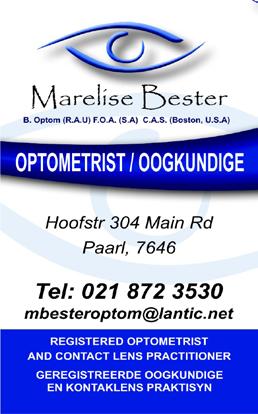
take part in the pilot programme.
Whether you’re drawn to gripping narratives, creative masterclasses, or thought-provoking debate, FLF offers something for every curious mind.
Enthralling discussions:
At the heart of the pilot project is a technology developed by the Center for Regenerative Design & Collaboration (CRDC). The technology allows plastic to be converted into an eco-additive – RESIN8 –that is added to concrete in the manufacturing of structural and other concrete products.
• Beyond Belief – Koketso Sachane talks to Gavin Evans about his powerful memoir of estrangement and reconciliation, Son of a Preacher Man.
• Skop, Skiet en Fauna – Wildlife thriller maestro, Tony Park (The Protector) and bestselling naval yarn-spinner, Justin Fox (Hell Run Tobruk) let Nancy Richards in on their secrets to creating convincing and gripping action.
Replacing up to 20% of natural aggregates with RESIN8 in concrete product manufacture has several advantages: It improves the performance characteristics of concrete products, reduces the amount of quarried material used in the concrete and removes plastic waste from the environment. Best of all, all seven types of plastic can be converted into RESIN8 and it doesn’t have to be clean to be used.
• The Sting of Story – Novels once helped to spark revolutions. But can fiction be resistance in a democracy? Letlhogonolo Mokgoroane weighs the weaponry of words with Elleke Boehmer (Ice Shock) and Siphiwe Gloria Ndlovu (The Creation of Half-Broken People).
CRDC SA has a processing plant in Cape Town from where the local leg of a global programme titled ‘The Bag That Builds’ is being rolled out. The programme is named after the distinctive green bags that are used to collect plastics for recycling.
Individuals and companies are rewarded per bag of plastic they collect, making it a simple way for anyone to earn a small income while improving the environment. A collection drive in the Langrug community has already led to the coining of the phrase ‘pick up your money’ to inspire residents to
• The Heart of the Matter – Jo Watson (The Ex Effect) explores the origins and classic techniques of romance writing with Jackie Phamotse (The Tea Merchant), Busisekile Khumalo (Rubies and Rain), and Qarnita Loxton (What’s Wrong With June?)
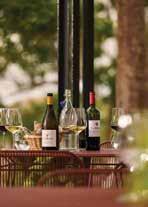
The pilot programme will run for three months from 1 January 2023 as part of a larger cleaning and recycling effort that is coordinated by members of the Franschhoek Heritage and Ratepayers Association (FHRPA). Current initiatives include the privatelyfunded clean-up crew that cleans areas that are outside municipal jurisdiction or that need extra cleaning, the installation (and servicing) of refuse bins where they are lacking and monthly community clean-ups.
• Van TikTok na die Tafel - TikTok sensations Najma Abrahams and Azba Fanie (Tietie en Nanna se Huiskos) will share kitchen secrets, family favorites, and the joy of cooking for loved ones — and their 221k-strong online family.
• Nuwe Lewe na ‘n Narsis – Susan Booyens speaks to Ilse Verster (’n Vrou staan op) about the severed wounds of emotional abuse –manipulation, control, gaslighting, and the slow erosion of self-worth. An important conversation about breaking freedom and standing strong.
Irmela Alberts, co-chair of the FHRPA says “We’re excited by both the environmental and economic opportunities this pilot programme presents for the valley. Our challenge now is to find ways to make it sustainable, so that the pilot programme can become a permanent one. We will keep the Franschhoek Valley cleaner, send significantly less rubbish to the landfill and through the involvement of the local schools contribute to creating a mindset where people litter less”
• In the Thirst Person – Just like good sex itself, good sex writing is a skill worth studying. Busisekile Khumalo (Rubies and Rain), Siya Khumalo (The Queer Book of Revelation), and Jo Watson (The Ex Effect) join Letlhogonolo Mokgoroane to define what makes a scene sizzle, and expose the cliches that will lock you out of your reader’s pants for good.
For more information or if you have any form of plastic that you want to get rid of feel free to contact Jocelyn at 073 587 6132.







• Love to Hate You – Tom Eaton (An Act of Murder) and Mary Watson (The Cleaner) discuss the art of crafting villains with Danielle Weakley. Continuedonp2...





Text: Editorial Desk | Image: Supplied

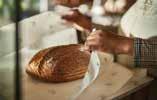
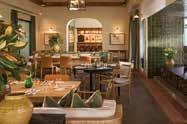

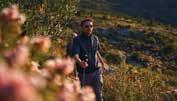
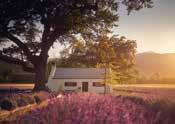

La Motte Tasting Room
- Sunday, 09:00 - 17:00
La Motte Farm Shop Tuesday - Sunday, 09:00 - 17:00
La Motte Ateljee Wednesday - Sunday, 10:00 - 17:00
La Motte Spens Tuesday to Sundays, 09:00 - 17:00
La Motte Hiking Trail Tuesday - Sunday, 09:00 - 14:00 Visit
An Unmissable
Weekend of Culture
...Continuedfromp1
Interactive workshops:
• Look Closely: Art Writing Workshop – Join Ashraf Jamal for a masterclass on writing about African art. Discover how to convey the rich stories and cultural significance behind the artwork while exploring techniques to deepen your creative and critical engagement with the continent’s vibrant artistic landscape.
• Hot Type: Romance Writing Workshop – Writing coach and author Sarah Bullen will teach you the must-know rules of romance writing: how to structure your plot and craft your love leads.
Plus: How have blockbusting “romantasy” writers like Sarah J Maas changed the game of romance fiction?
These are just a few highlights from a programme packed with engaging, original sessions. The full list can be found online and tickets can be bought via Webtickets.
Beyond the books, Franschhoek offers a feast for the senses. With charming vineyards, worldclass restaurants, and cultural attractions, there’s
no better place to spend the weekend. Here are a few activities to consider for between Franschhoek Literary Festival sessions:
• Sip and savour – Indulge in some of South Africa’s finest wines. The various estates in the area offer tasting experiences to complement the literary atmosphere.
• Dining delights – Enjoy gourmet meals at Reuben’s, Le Petite Ferme, or Le Petit Colombe, where seasonal flavours and expertly crafted dishes provide a perfect post-session indulgence.
• Explore and experience – Take a leisurely cycle along the Franschhoek Wine Tram, visit the Huguenot Memorial Museum, or browse artisanal goods at the Village Market.
With literature, culture, and culinary discoveries around every corner, the Franschhoek Literary Festival is more than a weekend—it’s a celebration of stories and the people who tell them.
For more festival updates, to view the full list of participants and to select sessions to attend, please visit the festival website and follow the festival’s Instagram account.
www.flf.co.za
Text: Editorial Desk | Image: Supplied
Stellenbosch Traffic Services made a giant leap into the digital arena on 28 March 2025 when its new computerised learner’s licence testing centre opened in Stellenbosch.
The new computerised system holds several advantages over the old paper-based system that has been in used for years. These advantages include improved accuracy, security and efficiency. Unlike with the manual process, it is also virtually impossible to cheat during the examination or afterwards with the results.
Introducing the system did mean that some learner licence candidates’ appointments had to be rescheduled as the classroom capacity was reduced from 20 applicants to 15 applicants. It is not known if this system will also be introduced at other testing centres in the municipal area.

Text: Editorial Desk | Image: Stellenbosch Mun The new computerised learner’s licence testing centre in Stellenbosch.
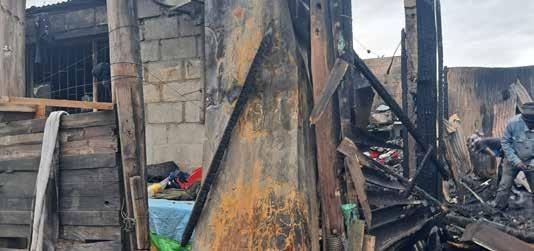
The Franschhoek Cableway project team has engaged extensively with the public and stakeholders over the past year. The team appreciates the diversity of views we have gathered from the Franschhoek community – both in support and opposition of the proposed project. The community input will now be carefully considered by experts in various fields to ensure that the eventual project is sympathetic to the unique character of Franschhoek, that it adds value to the totality of the community, environment and the local economy.

In pursuit of broad consensus, the project team has decided to pause statutory application processes to allow time for further consultation with community stakeholders and authorities. This step aims to comprehensively address concerns, mitigate potential impacts, and maximise the project’s socio-economic benefits. Constructive engagement with the community remains a priority, ensuring that the project moves forward with a greater level of consensus..
The design, layout, and offerings of the cableway stations remain conceptual, with ongoing input welcomed as part of the environmental and planning processes. With continued meaningful community involvement, the Franschhoek Cableway can become a world-class attraction that enhances the region’s appeal while preserving its heritage and biodiversity.
As Franschhoek competes in a dynamic global tourism market, it is vital to maintain its reputation as a luxury destination offering bespoke experiences. Sustainable tourism development is essential to support local job creation and infrastructure improvements.
Premier Alan Winde recently highlighted that every 30 new visitors to a location create one new job. Given Franschhoek’s rising unemployment — currently at 19% according to Stellenbosch Municipality — new initiatives are critical to long-term prosperity and stability of the town.
The Franschhoek Cableway Project represents a R400 million investment that will boost multiple tourism-related sectors, including trade, transport, hospitality, and community services.
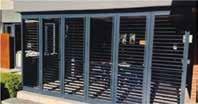

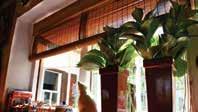

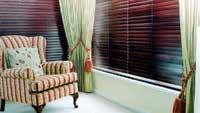
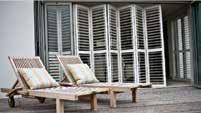
During construction, the local economy is projected to see a R190 million boost, sustaining 726 jobs, including 159 direct positions. Once operational, the cableway will contribute R41 million annually to the economy, sustaining 131 jobs, with 67 direct employment opportunities. The total tourism impact is projected to increase local production by R482 million, supporting 642 jobs and generating R108 million in household income.
A “Franschhoek First” policy will prioritise local employment, training, and procurement. Additionally, a portion of ticket sales revenue will be allocated to community development initiatives identified in collaboration with residents. Already through our engagement with community members, we have identified key areas of concern that will be addressed through careful planning. These include finding sustainable solutions the potential impact on traffic and working closely with the municipality and the Mont Rochelle Nature Reserve to manage biodiversity and fire risks. Visitor numbers can be capped and managed by limiting the maximum daily visitors and staggering the timing of trips through online ticket sales. With continued community engagement, we are certain that workable solutions can implemented.
The project team remains committed to working in close partnership with the community to unlock the socio-economic benefits essential to the valley’s future. More time will be dedicated to strengthening this partnership approach before moving forward.

When was this book club founded?
The first recorded information about this group dates to 2001. Marieta Malherbe, Elsa Malherbe and Marié Joubert are the original members. The members had a calling list to remind each other of the next gathering. Members of our current book club travel from Wellington, Paarl, Villiersdorp, Greyton, and Kleinmond. We also have English-speaking members who joined to improve their Afrikaans and be part of the community.
Why was the meeting with Michiel Heyns so special?
Michiel Heyns, an accomplished and awardwinning author, translator, and academic, shared his writing process and inspiration. He took a deep dive into his novel ‘A Poor Season for Whales’. His characters develop through incisive dialogue, wit, and humorous social interaction. All is not what it seems when a middle-aged, divorced woman is assisted by a young stranger who saves her dog. The denouement is as unexpected as life sometimes turns out. It was a privilege to hear Michiel speak about his writing and translations of eminent Afrikaans authors’ work into English.
What made ‘Die Verleiding of Eva de Winter’ so tantalizing?
Louis Kruger, the author, is a religious minister serving the maritime and shipping community in Rotterdam. He was in South Africa, and we were fortunate to have him join our meeting. This riveting novel touches on contemporary issues of modern society and marriages of convenience. Big data hacking by professionals to assist law enforcement officials, human trafficking, and the corruption of a high-ranking justice professional, Eva, are the major strands
running through the novel. Money and power are the key motivating factors for transgressions. We were able to ask Louis pertinent questions about the salient themes within the novel.
You recently discussed ‘Bloubloed’ by Daniel Lötter?
Daniel Lötter is a sought-after speaker and raconteur. His book is a historical account of royals and aristocracy with close ties to South Africa. The past colonial history had some aristocracy settling here or living in exile throughout their lives. Daniel led the group with a lively banter and humorous discussion.
In what unusual way did Lien Botha the author of ‘Vin’, engage with the readers?
The award-winning author and accomplished artist engaged the readers with an interactive process of drawing items or clues relating to the novel’s themes and content from a box. Her novel is about an artist/curator’s introspection and personal struggle. This is all against the fascinating backdrop of world travel to historical art destinations. Each participant could share what they understood to be the meaning of the items drawn.
Which classical novels did the club read?
John van Zyl, a retired professor and head of Media Studies at the University of Witwatersrand, succinctly discussed ‘Pride and Prejudice’ by Jane Austen. Mrs. Bennet and her five daughters fell on hard times after her husband, their father, died. They had to downgrade their living standards and relocate to a small humble cottage. Their search for suitable husbands is a most moving and heart-rending journey. The protagonist, Elizabeth Bennet, develops into a well-rounded and mature woman of integrity.
One can never forget the Bennet family! Emily Brontë’s ‘Wuthering Heights’ brought back memories for many of us who had this novel prescribed in our matric year. The tortured love between the dark Heathcliff and Cathy Earnshaw still haunts most readers. One can still recall their forlorn cries to each other on the windswept moors.
Can you tell us about future books to be read?
‘Gebeente’ by Etienne van Heerden will be discussed in June. Van Heerden initially studied law and was admitted to the bar as an attorney. He freelanced as a deputy sheriff for the Civil Court. He then moved into advertising and completed his PhD in engagement and postmodernism. He won
the highest award in Afrikaans literature, the Hertzog prize, for ‘Toorberg’, He is known for his magical realism and complex, layered narratives. This novel resonates with me, as I resided in Sutherland while my husband worked on site at the SALT telescope.
Dr. Amanda Marais, a lecturer at the University of Stellenbosch, is a regular visitor. Her handling of texts is engrossing, and she will be expounding her insights on ’Gebooie’ by Rudi van Rensburg. How does being a member of a book club enrich one’s life?
Each member is encouraged to read a selection of genres, not always of their particular interest. During the conversations regarding the book at hand, a deeper understanding of the text is gained. We also have other activities during the year, which foster friendships and allow us to invite prospective members.
Where and when do you meet?
We meet monthly on Thursdays at 14h30 in the Dutch Reformed Church Hall. Notice of our meetings appears in the Tatler.
Contact Hester Strümpher 084 900 9060

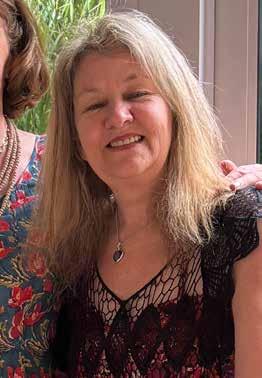
Offering all regular audiological (hearing) assessments, the supply and repair of all types of mainstream hearing aids, auditory processing assessment and therapy, and tinnitus management.

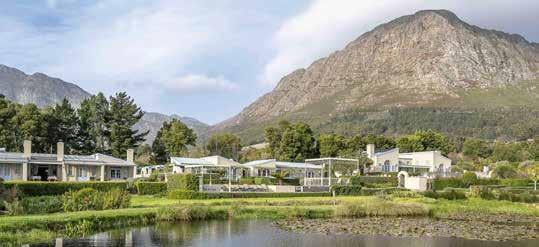

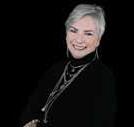
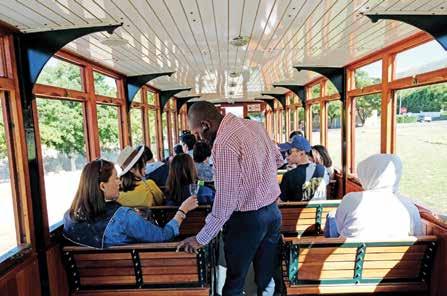
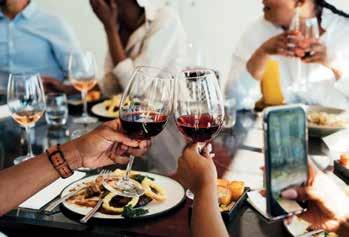
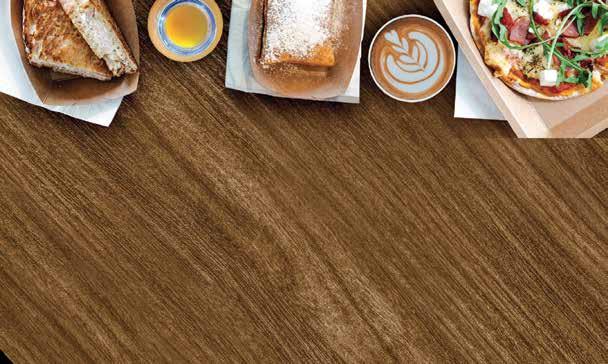
Premium wine producer, DGB, was named the Best South African Producer for the fourth consecutive year at the prestigious Mundus Vini Spring Tasting. The announcement was made at the Prowein trade wine show in March 2025. DGB’s brands include Franschhoek Cellar, Bellingham, Boschendal, Old Road Wine Co and Backsberg.
This historic win marks the first time any producer has secured this accolade four years in a row. Robert Joseph, a global wine authority who is a judge and board member of Mundus Vini, says: “To win the top South African Producer for four consecutive years is an outstanding achievement.”
DGB’s performance at this year’s competition includes a haul of 31 gold medals and 27 silver medals across its diverse portfolio of wineries. In addition to the already mentioned wineries Fryers Cove, Douglas Green and Vineyard Friends also contributed to the haul.
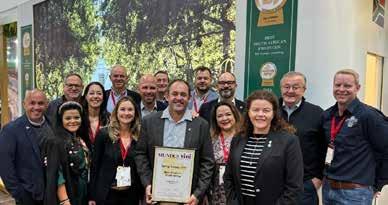
“To win this amazing accolade at Prowein as the top South African for the fourth consecutive year is the ultimate tribute to the passion and expertise of our Viticulture and winemaking teams,” said Tim Hutchinson, executive chairman of DGB. “It is also gratifying to see our major investment in premium vineyards starting to pay dividends.”
The Mundus Vini Spring Tasting is one of the most esteemed wine competitions globally, attracting thousands of entries from top producers around the world. DGB’s consistent success at this event highlights its position as a leader in the South African wine industry and its ongoing pursuit of winemaking excellence.
DGB’s gold medal winners were: Backsberg Blueberry Row 2022, Backsberg John Martin 2023, Backsberg Smuggled Vines Chardonnay 2024, Backsberg The Patriarch 2022, Bellingham Homestead Pinotage 2021, Bellingham Homestead Sauvignon Blanc 2024, Bellingham The Bernard
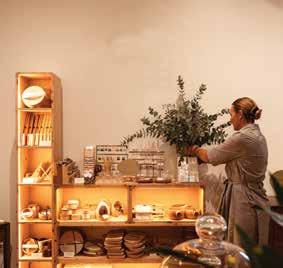
Bush Vine Pinotage 2022, Bellingham The Bernard Old Vine Chenin Blanc Cape Town 2024, Bellingham The Bernard Old Vine Chenin Blanc Limited Release 2024, Bellingham The Bernard Series The Maverick SMV 2021, Boschendal 1685 Chenin Blanc 2024, Boschendal 1685 Shiraz 2021, Boschendal Appellation Series Elgin Pinot Noir 2023, Boschendal Black Angus 2021, Boschendal MCC Brut NV, Boschendal MCC Grande Cuvee Brut MCC 2017, Boschendal MCC Jean Le Long 2012, Boschendal Nicolas 2022, Boschendal Sommelier Pinotage 2022, Boschendal Suzanne 2024, Boschendal Vin d’Or Noble Late Harvest 2022, Franschhoek Cellar La Cotte Mill Chenin Blanc 2024, Franschhoek Cellar Statue de Femme Sauvignon Blanc 2024, Fryers Cove Chenin Blanc 2024, Fryers Cove Sauvignon Blanc 2024, Old Road Wine Co. Grand-Mere Single Vineyard Semillon 2022, Old Road Wine Co Le Courier Chenin Blanc 2024, Tall Horse Chenin Blanc 2024, Vineyard Friends Chenin Blanc 2024 and Vineyard Friends Pinotage 2022.
www.dgb.co.za Text: Editorial Desk | Image: Supplied
As May ushers in the cool embrace of winter, our valley becomes a seasonal sanctuary of crackling fires, velvety red wines and wholesome meals that warm the soul. The summer days may be behind us, but in their place comes a month rich with culture, art and wine - promising much indulgence for those who love a little layering up.
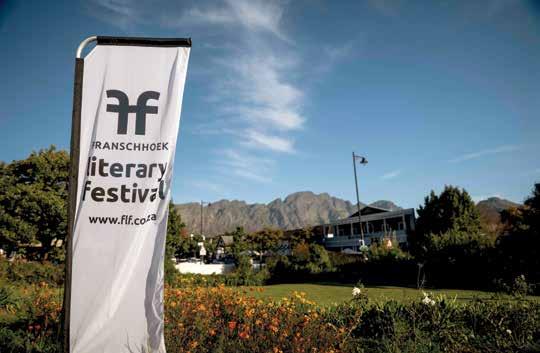
For those craving a winter escape with a twist, our Mystery Weekends are back - an indulgent staycation with zero planning required. Immerse yourself in luxurious accommodation and bespoke experiences, while the allure of mystery unfolds, complemented by fine wines and delightful surprises.
Looking further ahead, be sure to mark your calendars for the 2025 edition of 'Eat, Sleep, Drink' in June - your chance to discover just why we’ve earned the title of South Africa’s Culinary Capital. With exclusive deals on accommodation and exceptional fare at carefully selected partner restaurants, this is the perfect opportunity to indulge in
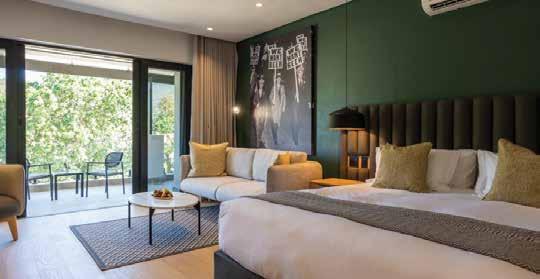




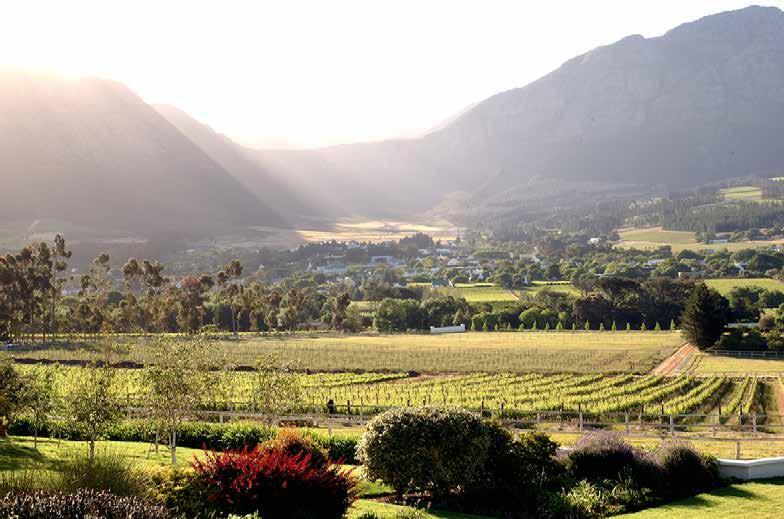
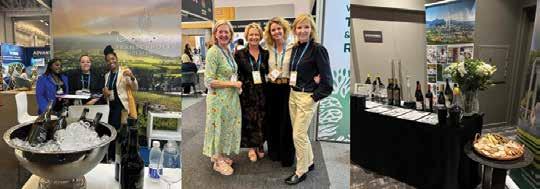

We look forward to setting the stage for your unforgettable Franschhoek experiences this May!

Chantal Lascaris
As the mornings turn crisper and the vines turn those unmistakable autumn hues, something shifts in my kitchen. Summer’s flurry of breezy nocook meals gives way to the quiet promise of slower cooking. But before I dive into bubbling stews and roasted roots, I find myself standing in front of my pantry, feeling that familiar itch: it’s time for a reset. Let me confess something—my pantry is a bit like that drawer in everyone’s house full of batteries, mystery cables, and one rogue birthday candle. It’s not chaotic, exactly, but it does contain things I have no memory of purchasing. (Who bought four tins of butter beans? Oh… me.)
So, once a year—usually when the weather turns—I pull everything out. It’s somewhere between finding gold and wondering why I ever thought I needed four types of couscous. I find grains I can’t pronounce, spices that expired during lockdown, and at least one jar of something sticky that’s leaked quietly onto everything else.

But here’s the joy: among the expired turmeric and dubious quinoa, I also find inspiration. A bag of lentils becomes a soup. A forgotten tin of chickpeas becomes dinner. Even the last sad walnuts end up toasted and sprinkled over roasted butternut like I planned it all along.
Spices get a sniff test (if you can’t smell it, it’s just brown dust). I refill the good stuff—cumin, cinnamon, paprika—and feel wildly accomplished just for putting them into matching jars. Honestly, it’s the closest I get to feeling like an organised adult.
Once the chaos is cleared and the shelves are wiped, I take stock. Do I have enough olive oil? (Never.) Am I emotionally ready to part with the expired jar of tahini I keep pretending I’ll use? (Also no.) I scribble a short list—stock, tinned tomatoes, honey, a wedge of something hard and salty—and suddenly the kitchen feels full of potential again.
So before you hit the shops or the recipe books this autumn, take a peek into your pantry. You might just discover dinner—and a little joy—hidden behind the tinned peaches.
One of my favourite pantry rescues is a warm chickpea and tomato stew. Add in some left over
The 2025 Eat Out Woolworths Restaurant Awards were announced at the Baxter Theatre Centre in Cape Town at the end of March. The ceremony was a star-studded affair, bringing together the country’s leading chefs, restaurateurs and industry figures for an evening celebrating South Africa’s culinary excellence.
“This year’s winners represent the pinnacle of South African dining,” said Abigail Donnelly, Eat Out’s Culinary Director. “The new judging process ensures that every star awarded truly reflects consistent excellence, from innovation on the plate to the overall guest experience. The level of talent and dedication in our restaurant industry is nothing short of world-class.”
Eat Out’s star-rating system remains the gold standard in South Africa, with restaurants earning 1, 2 or 3 stars based on their final scores. The criteria cover every aspect of the dining experience, from food quality and technique to service, ambience and value. The coveted 3-star rating is reserved for restaurants scoring over 90 out of 100, while 2-star and 1-star ratings go to those scoring between 80 and 89 and 70 and 79 respectively. Achieving even a single star is no small feat, with only the very best making the cut and setting themselves apart.
Salsify at the Roundhouse in Camps Bay was awarded Eat Out Woolworths Restaurant of the Year, having attained the highest score of any restaurant in the country. The judges said: “It is a restaurant that balances the history of its unique setting, acknowledging and critiquing its past while celebrating its immediate environment through hyper-local foraging. This storytelling runs through its menu, complemented by attentive, knowledgeable and friendly service. There is a wonderful sense of generosity here, and guests feel special from the moment they arrive.”
Local restaurants that made the cut are:
• One Star - Chefs Warehouse at Maison, Le Coin Français and Orangerie at Le Lude
• Two Stars - Epice and Protégé
• Three Stars: La Petite Colombe
The local winners also featured in the Special Awards section. Epice walked off with the Eat Out

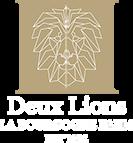
veggies lurking in the back of the fridge drawer and you’ve created the edible equivalent of a hug – no frills, no fuss, just pure comfort. Here’s how to make it:
Serves 4
1 Tbsp olive oil
1 onion, finely chopped
¼ tsp minced garlic
¼ tsp turmeric
½ tsp cumin seeds
½ tsp coriander seeds
¼ tsp finely chopped chilli (or more if you like it hotter)
1 red pepper, roughly chopped
½ brinjal chopped
4 baby marrows, sliced thickly on the diagonal
½ x 400g can chopped tomatoes
2 Tbsp tomato puree
¾ cup water
½ x 400g can chickpeas drained
Salt and pepper to taste.
Heat the oil in a saucepan and sauté the onion and garlic until the onion has softened.
Stir in the turmeric, cumin, coriander and chilli and cook for about a minute.
Add the veg, tomatoes and purée and mix together.


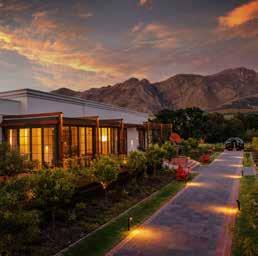
Callebaut Dessert Award, while La Petite Colombe was awarded the Eat Out Patrón Mixology Award. Roy Bagattini, Woolworths Holdings Group CEO, says: “At Woolworths, our commitment to innovation, sustainability and sourcing the finest ingredients goes beyond what’s on the plate –it’s about fostering a thriving, responsible food industry. The Eat Out Woolworths Restaurant Awards celebrate the visionaries shaping the future of dining in South Africa, from chefs pushing creative boundaries to those leading the way in ethical and sustainable practices. We are particularly proud of the restaurants setting new standards for sustainability in the industry. These awards highlight the passion and dedication of those who inspire us all to elevate food culture while making a lasting impact.”
Text: Editorial Desk | Image: Eat Out
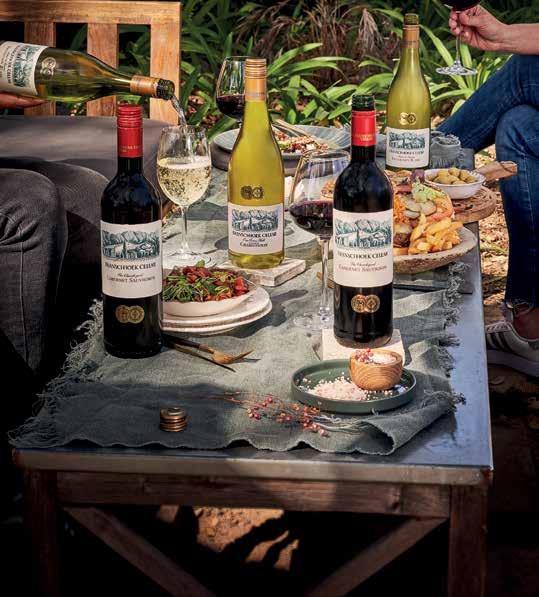

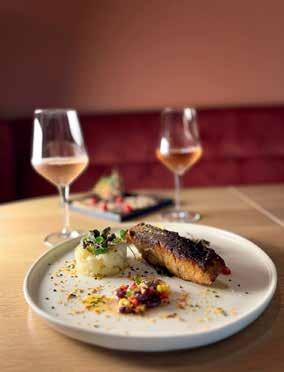
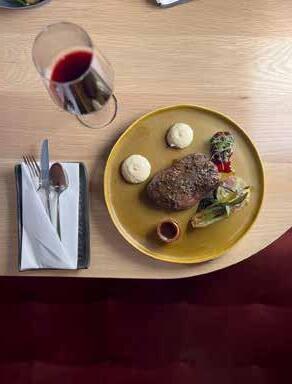
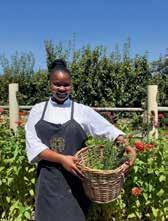
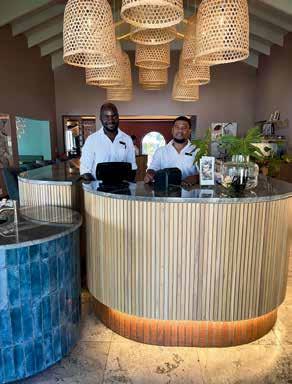

MICHELE LUPINI

If you can’t beat ‘em, join ‘em. Ford’s Made in China Territory tested
The car world is changing. Faster than you’d ever imagine. If ever there was a car that encapsulates that, its this Ford Territory. It’s the Car of the Future. Ni, its not to do with looks, tech or future ideas. It’s how, and where this Ford is made, that makes it a pioneer. Why? Well, the 2025 Ford Territory is Made in China. Built by Jiangling Motors Co, or JMC in Nanchang and based on the JMC Yusheng S330, it’s also cousin to Landwind’s X7 Evoque knock-off. Reimagined and restyled with input from JMC JV partner Ford, sold in the Chinese market as the Equator Sport and in South Africa and other markets as the Territory, all that makes it the setter of what can only become a most significant new trend.
The range starts with the R590K Territory Ambiente, steps up to the R646K trend and tops off with this R721K Titanium. Take off fifteen grand if you don’t want the service plan. It rivals the Toyota RAV4, which sells for between R712 and R825K in front drive petrol form, the new R664 to 852K Volkswagen Tiguan, the R622 to 823K Kia Sportage, and Hyundai’s R589 to 859K Tucson.
Territory bridges the Great Wall
Which means it also competes with real Chinese badges. Like the R492 to 679K Chery Tiggo 7 Pro Max, R479 to R679K Haval H6, R549 to R679K Jaecoo J7, and the R519 to R559K GAC Emkoo. As you can see, it’s pretty wild in the R679-odd grand middling SUV market!
Taking top models like this car then, Territory sits in a most interesting position. It undercuts it’s adopted traditional rivals by a hundred grand, while putting a forty grand premium on its Chinese homeland cousins. That’s not a very big jump for the comfort of your trusted Ford dealership, one of the world’s biggest and oldest car badges on the bonnet and an onboard system that actually communicates in English, is it?
And that’s why this is the Car of the Future. Ford is first to figure that if you can’t beat them, join
them. This Chinese Territory addresses many of the lingering concerns punters have about yellow metal, by planting a Ford badge on the bonnet of a Chinese car subtly refined to deliver what traditional buyers will expect. And it charges a quarter of the premium its traditional rivals do, for the favour. Then watch the puppets dance!
The Territory is only forty grand more expensive than its home based cousins. The Toyota, VW and the Koreans add an extra hundred grand to the price of the Chery and Haval, and almost three hundred to the GAC. How long can those premium rivals keep competing with upstart rivals that are almost as good but cost a quarter less? Put a VW or Toyota badge on that Emkoo for R599K and then watch these puppets dance!
Which is why we reckon tha won’t be too long before most carmakers will not be able to compete without a significant proportion of their cars being built by the Chinese. With a little nip and tuck to make it, well corporate and traditional enough. The Ford Territory is just the first such thing…
So what about this Ford Territory? Well, we decided to forget that it’s just a JMC Yusheng S330 in drag and drove it as if it was a Ford. Personally, I’ve owned many Fords over the years. My XR3, Cortina and Courier bakkies, Sapphires and more. Among them, some were even made out of Mazdas. Ah, my Laser 1600 Sports! Most groaned and moaned when they first put the Oval on a Mazda. In the end, who really cared?
Territory replaced fiery Kuga
Most carmakers share their spit these days. So much so that it’s difficult to keep up. Ford divorced Mazda and hooked up with Volkswagen. Why should it be different with Jiangling, as it is with this Territory? Territory basically replaces the fiery Kuga in the vital five-seater small SUV space.
Ford calls its rebadged Chinaman stylish and compelling with proper space, comfort, smart tech and safety. And you know what? We can’t really argue. Sure, that’s not quite Ford’s latest face, considering it’s Everest’s kid brother. Adopted, of course. And that lack of rear track makes it look a little like your anorexic auntie in a midi skirt. But this one’s 19-inch alloys win a bit back. Overall, it’s a solid effort in its own right.
Our Titanium packed it all into its multicolour LED ambient lit two-tone ‘peacock blue and domino’ leather trimmed cabin under that gaping panoramic moonroof. 10-way power driver and four-way power front passenger seats set the scene, while the broad
In the aftermath of WWII, Mercedes-Benz revived its motor manufacturing with the revival of the pre-war W136 model that, despite the troubled times, was actually a significant model in the company’s history. The W136 was launched in February 1936 and represented M-B’s four-cylinder range. The first model was the 170V and it was an instant success, the V in the car’s nomenclature being an abbreviation of ‘vorn’, meaning ‘front’, to differentiate it from the contemporary rearengined W28 170H (‘heck’ – ‘rear’) that used the same engine.
During the war the Mercedes-Benz plant suffered severe bomb damage, but the body shop and enough of the W136’s tooling survived the Allied bombing, or could be recreated, for it to serve as the foundation upon which the company could rebuild. By 1947, the 170V had resumed its place as Mercedes’ top-seller. In May 1949 the 170D was presented at the technical export fair in Hannover. It was based upon the 170V but equipped with a diesel version of the proven power unit of its sibling. The M136 engine was a 1 697 cc four-cylinder
indirect-injection diesel delivering 26 kW at 3 200 r/min and 96 N.m of torque at 2 000.
The 170D was the world’s third diesel-fuelled passenger car and the first to be introduced after the war when, for some time, petrol was in scarce supply whereas sufficient diesel oil was available everywhere. The 170D became the basis for the lasting success of this type of car.
In May 1950 the M136 engine was increased to 1 767 cc, raising maximum power to 30 kW and lifting peak torque to 101 N.m. The 170 D received other upgrades including telescopic shock absorbers, a wider rear track and stronger brakes. The cabin was widened by 50 mm allowing bigger and more comfortable seats to be fitted, while the luggage compartment finally became accessible from outside via a bottom-hinged boot lid that housed the spare wheel.
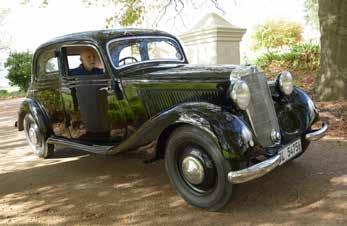
FMM’s 1952 170D has a slightly worn patina and it proved to be a satisfying – if slow –driving experience. The 170D offered similar driving performance to the 170 V – 0-100 km/h in just over a minute – but was naturally more economical. Its looks are typical of the period with front and rear doors hinged on the B-pillar. Stepping inside is easy and the dual front seats live up to expectations; broad and fairly comfy with plenty of foreaft adjustment. Starting calls back the past when glow plug delay was the thing, a diesel symptom that lasted into the 1980s. Once the ignition is switched on, a dash-mounted lever needs to be turned to ignite the glow plug that takes a little while to get up to heat, and then twisted to allow the engine to clatter into life.
12.3-inch landscape highdefinition digital touchscreen and instrumentation sit proud on the soft-touch he doubledecker console.
Territory cabin a luxury, leathery space

The eye-catching space features Bluetooth, CarPlay and Auto rich infotainment with a wireless phone charger and three front and a rear USB port, as well as fine eight speaker audio and a proximity camera backed by front and rear parking sensors. There are enough buttons in there along with the steering controls and centre console knobs and a rotary controller to deliver a decent balance between swipe and touch control.
While you may know something of the geological forms seen in the Franschhoek Valley, it is no simple task to piece together these features into a story of the valley’s geological history. Local geologist and published author, Nick Norman, speaks and writes accessibly about the otherwise remote world of rocks. Born in Kwa-Zulu Natal where he completed his M.Sc in Geology, Nick has explored far and wide in search of the stories embedded in rocks. After exploring South American and Southern African geological features, Nick settled in Franschhoek in 1981 where he has since continued to write and explore the world of rocks.
Nick tells the fascinating story of how the Franschhoek Valley has taken on its present form after hundreds of millions of years and is still changing. You may know that the Franschhoek Mountains are formed from sandstone, a kind of sedimentary rock, and form part of the Cape Fold Mountains. Nick emphasises that these mountains, despite forming part of the Cape Fold Mountains, do not owe their current form to the process of folding (the convergence of plate tectonics that heaves vast quantities of the Earth’s material upward, forming mountains). Rather, our Franschhoek Mountains and valley were formed from an extremely slow process of erosion, mainly by water.
Territory’s actual digital displays are another significant step above the average Chinese rank and file. They’re clear, concise and logical. Best of all, they present in pretty well queen’s English, rather than last season’s google translate Mandarin that’s common to most of its thoroughbred Chinese cousins. The spacious 448 litre boot expands to 1422 litres via the flat-folding 60/40 split bench. Our Titanium added heated power folding wing mirrors and puddle lamps too.
Fire it up and the 138kW 318Nm 1.8-litre turbo four-pot with EcoBoost badges on its tappet cover comes to life with an earthy growl. Its auto startstop seven-speed dual-clutch transmission turns the front wheels, backed by four Normal, Eco, Sport and Mountain modes as well as hill start and descent controls. And don’t forget the alphabet soup of driver and safety assistants.
In accounting for this, Nick takes us back to almost 600 million years ago. He explains that a sedimentation process was underway at this time, followed by folding. Igneous intrusions were being formed (molten rock which pushes its way up from the Earth’s mantle and into sedimentary rock formations). These would form Paarl Rock and the granite rock formations on Montpellier farm (near Bridge House School), exposed to the surface by erosion. The deposition of the sediments would form an impressive basin extending from Clanwilliam to Port Elizabeth and beyond (now removed by Continental Drift).
The Ford Territory is a motoring pioneer 138 kilowatts ad 318 Newton metres is juicy. It translates to a pretty handy 8.8 second 0-100 on out test strip and a surprisingly virile attitude on the road. Its reasonably damped, if a touch distant in feel, but responsive and enjoyable, while still pretty economical too. It’d be much quicker if there was a way to temper the nannies. We did feel hemmed in by all the electronic control. We’d prefer a simpler way to switch what we don’t want off, too.
But that’s cutting straws. The Ford Territory is more than just a worthy rival to all the rivals we mention up top. Over and above all the other Ford add-ons, a genuine four-year 120 000km Blue Oval
The folding that would ensue once more, explains Nick, would heave material up to an almost Himalayan scale! This time the erosion of these gigantic mountains would supply sediments extending across the entire Karoo Basin. Millennia of erosive action would give way to a gently undulating plain. At this stage, the supercontinent, Gondwana, would start to break up due to stirrings
warranty with a two-year unlimited service parts plan offers optional extended Ford Protect Service or Maintenance plan upgrades.
Which leads us to conclude that this Territory is a landmark car. It blends it new world Chinese roots with enough true blue Ford traditions to make its subtle premium over its home badged Chinese rivals more than palpable enough. And pretty much a no brainer over its hundred grand dearer ‘first world’ rivals to anyone with real
Which
Nick Norman with the Wemmershoek Mountains in the background.
in the Earth’s mantle. This movement would shape the landscape anew - new continents, mountains, oceans, coastlines, and rivers. This landscape dictated how the water would flow inland, capturing previous headwaters, and finding its way toward the oceans. In so doing, these active young rivers would carve out new valleys. And this is how the Franschhoek Valley and surrounding mountains came into being.
testing:
Absolutely no use as a getaway car, then... And boy does it clatter. Put the long, spindly, bent gear lever of the all-synchro four-speed gearbox into first and away it goes, the amount of low-down torque sufficient to get the 1 250 kg saloon up and running with no fuss at all. Naturally aspirated, the oil-burner goes about its business with a barely imperceptible change in diesel clatter whether hauling or cruising. A tiny dash-top rear-view mirror is all that is provided to see behind, but with a top speed a little over 100 km/h, driving is more a case of simply concentrating on the road ahead and enjoying the scenery at a leisurely pace.
Ride quality is surprisingly good. The front suspension is independent with coil springs and M-B’s chassis engineers worked hard to progressively improve the coil-sprung swingaxle rear suspension, resulting in improved handling traits as well. The big three-spoke wheel is fairly heavy in operation, typifying the solid feel of the car in general. The all-drum brakes stop effectively enough.
In 1950 and 1951, Mercedes-Benz director G Paulus toured Southern Africa in a 170D to test the local markets. He must have liked what he saw, because the local company and its manufacturing facility, first as part of CDA then as UCDD, has grown into one of the country’s leading motor manufacturers with huge ongoing investment as a key player in the global Daimler-Benz organisation.
The W136 was Mercedes-Benz’s top-selling model range between 1936-39 and 194753 before being replaced by the 170S-V and 170S-D. For a design that is almost 90 years old, it still impresses and represents a key model in Mercedes-Benz’s history. FMM’s car will be part of the German marques-themed display in Hall B from the beginning of May.
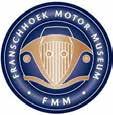
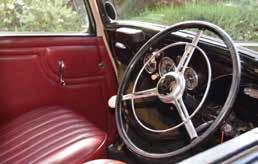
From the beginning of May, on display in Hall B will be a selection of German marques featuring Audi, Auto Union, BMW, Borgward, DKW, Mercedes-Benz, Messerschmitt, NSU, Opel, Porsche and Volkswagen
Traces of this history can be identified in the valley. For example, river stones may be observed near Wemmershoek Primary School, which testify to the fact that the Berg River had meandered from one side of the valley to the other, carving out the valley as it went. The geological foundations described have also set the scene for the ecological systems surrounding us. From the sandy nutrient-poor soil, derived from the extremely hard quartzitic sandstone, the world’s most bio-diverse flora has sprung forth: fynbos. Indeed, the harsh conditions have required our indigenous plant life to be resourceful, adaptive, and evolutionarily creative. It follows that the fauna have also had to acclimatise to this harsh terrain. And yet, the valley’s ecology has provided enough organic matter, mixing with the eroded sedimentary rock and granite, to form soil that is fertile enough to produce some of the world’s finest wines and natural produce. And so we find ourselves entwined in the ongoing geological and ecological story of the land in our valley. If this story piqued your interest, Nick’s books can be purchased or ordered from your local book vendor. His publications include Going to Ground, Box of Rocks, Geology Off the Beaten Track, The Extraordinary World of Diamonds, and Geological Journeys. For more information about Nick, you can visit his website: https://www.nicknormanbook.com/.
Text: Leila Shirley | Image: Nick Norman
FMM’s opening times are Monday to Friday 10h00 to 17h00 (last admittance 16h00), Saturday and Sunday 10h00 to 16h00 (last admittance 15h00). Visiting the museum is by appointment only and via online booking. Entry fees: R90 adults, R70 pensioners and motor club members (with membership ID), R50 children (ages 3-12). Only electronic payments are accepted.
The famed FMM Pitstop Deli is open throughout the visiting hours, offering refreshments, sandwiches, snacks and light meals. There are also counters offering exciting estate products and souvenirs. A selection of wines produced by Anthonij Rupert Wyne is also available For booking tickets and any other information as well as signing on for a free monthly newsletter, logon to www.fmm. co.za or phone 021 874 9000 or e-mail fmm@fmm.co.za

I’ve often mused in the past on how May is one of the most unpredictable months of the year. Every farmer in the winter rainfall area will tell stories of the years they waited for the rain to sow their crops, with the end of May being the ultimate deadline. In dry years the joke is that farmers plant on the 50th of May. This year things seem different. We were blessed with abundant early rains, and winter quickly pushed a short autumn out of the way.
My soil is too waterlogged to work already – a pity because I had big plans to prepare new sections for vegetable planting in spring. I will have to go no-till this season and will experiment with sowing a green manure crop in narrow drills in the soil. Adding some radish and other root crops should loosen the soil enough to make up for the lack of deep cultivation. This green manure sowing must be done before the end of the month to ensure enough biomass to dig into the soil in spring. Finding a decent green manure seed mix in small quantities might be difficult and expensive for the home gardener. I’ve successfully used a mix of my expired vegetable and flower seeds combined with a garden bird seed blend from the pet food section. This gives a good variety of grains and green material. Adding some peas to the mix will trap nitrogen in the soil for the next season.
May is the month that takes us right into the heart of autumn. This shift into our rainy season often brings unpredictable weather, and this year seems no different. Despite some good rain before Easter, the soil is drying out fast, and farmers and gardeners are keeping a close watch on weather reports. We are in a major winter grain farming region (wheat, barley and canola), and our farmers play an important role in food stability in our country. The certainty of adequate and timely rainfall in winter has helped build generational wealth in the Overberg and Swartland regions. A changing climate is forcing farmers to adapt and diversify, and we gardeners should be no different.
The years of water shortages and a looming “Day Zero” have taught us good lessons and habits, but also showed us the absolute importance of irrigation water and the devastating effect a lack thereof can have on our gardens. Rainwater harvesting has become the go-to option for many, but homeowners are mostly hamstrung by their lack of tank storage space. A privileged few can install boreholes. Most gardeners are, however, stuck with costly municipal water and forced to use it sparingly. Experienced gardeners have learnt to make the most of the rain, and autumn and winter are when we do most of our new plantings. May is one of the best months for planting out large shrubs and trees. Days are cooler, there is the expectation of rain, and we have less wind. Your garden beds will also not be too waterlogged to walk in or work yet. It is also the time of the year when we build our soil. Thick layers of mulch will prevent compaction and run-off from winter storms and will slowly decompose to add nutrients to the earth. Nothing beats home-made compost as a soil conditioner, but the home gardener often generates so little that it is used for prized plants and the food garden only. It is a great time to spoil your garden with some bought-in nutrition. Kraal manure, chicken litter and commercial compost are available in bulk in most towns and will be an investment that will pay off as you increase your soil’s water and nutrient holding capacity. There is still time to get a green manure crop on bare areas. I use a mix of all my expired seed packets, garden
You will have to utilize the sunny days between the cold fronts to their best, because May is a busy gardening month, with the rewards only coming much later in the season. Your autumn pruning should be well on its way by now, with only the late flowering shrubs such as Solanum, Tecomaria, Leonotis, Lavender, Plumbago and Hibiscus that still needs to be pruned. Tree surgery to deciduous trees also needs to be done sooner rather than later. Pay attention to overgrown evergreen trees and shrubs by cutting away some of the lower branches and opening the canopy to let in more sunlight. Perennials such as Canna’s, Michaelmas daisies, Japanese anenomes, Salvia and Gaura should all be cut back hard this month. Fertilise and mulch afterwards. Lift Dahlia bulbs if you have clay soil; in well-drained soil most bulbs and tubers can be left in the ground over winter. Fertilise all winter flowering shrubs with a balanced fertilizer.
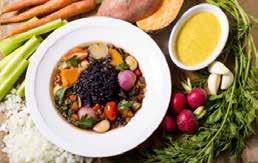
bird seed, peas and a meadow flower blend. This creates a beautiful mess to enjoy during the grey winter months before it is cut down and dug into the soil in spring.
Measured
Not much can be done about the lawn now, apart from setting the mower a bit lower to allow less shading on the roots. We have also found that an application of calcitic lime before winter will prevent the acidification we get during the rainy season. Fulvic acid as a foliar spray helps with photosynthesis and is a hack used by greenkeepers during overcast periods. Your summer-flowering shrubs must be pruned this month. Feed winter and spring-flowering shrubs like Azalea and Camelia with a potassium and phosphate-rich fertiliser. Roses can be left alone as they slow down for their winter rest.
Your lawnmower can be set slightly lower. This will allow more sunlight to the lower swards of grass and help against diseases. Lawns should be fed with a high potash feed to ensure good root growth through winter. Applying agricultural lime at a rate of 50g per square meter helps keep winter weeds at bay and will help ensure a lush spring lawn.
The nurseries are stocked with all sorts of winter colour – sweet peas, delphinium, dianthus, foxgloves, Iceland poppies, larkspur, pansies, viola, primula, stocks and lobelia. Patient gardeners can still sow seeds of all of these. The last of the winter and early spring flowering bulbs such as Lachenalia and Watsonia must be planted before the middle of the month. May is probably the best month to establish new Fynbos gardens. Trees planted now will have a chance to establish a decent root system before the summer heat arrives.
In the food garden, it is time to get rid of the last of the summer crops that are still hanging on. Prepare the beds well for winter planting. There is still time to get cabbage seed in, but visit a seedling nursery to give you the head start you need. Prepare pea beds well and install trellising before sowing. Sweet peas are a fragrant and pleasing addition to the garden, and we try to get most of our fencing covered with them. They need deep, rich soil and respond well to planting in double-dug trenches. Sow root crops like carrots, beetroot and turnips regularly. Leafy crops like celery, spinach and lettuce can be sown in situ and thinned later, but they are best planted in seed trays in the greenhouse.
In the vegetable garden beetroot, broad beans, cabbage, carrots, celery, Swiss chard, onions, peas and turnips can all be sown now. Winter is also the most successful time of the year to grow salad crops in the Cape; summer is often simply too hot. Sow cover crop on unused beds, even letting weeds grow is better that leaving the soil exposed.
Things are slowing down in the kitchen as most of the summer veggies and fruit are nearing their end. Now is the time to enjoy the fruit of your hard work by cooking up slow broths and stews from your stored and preserved produce. Your guests won’t mind the wait as you serve them platters of your best preserves and jams; even better if it is accompanied by some homemade wine or beer.
Happy gardening
In our house cold and rainy autumn days are spent in the kitchen. Soups, broths, stews, and slow roasts are the order of the day. While these are slowly bubbling away on the stove, we will have an abundance of guavas to process into preserves and chutney. I will also be dreaming about next season, and the abundance that I hope for by this time next year. Last year’s lack of planning and timeous action left our pantry quite empty this winter.


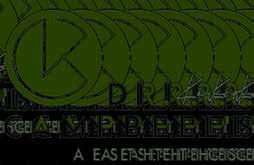

•



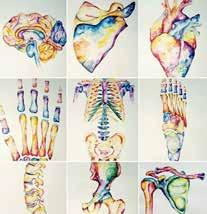


“An investment in knowledge pays the best interest”
With the bulk of our charitable disbursements going to financially supporting the education of currently 24 students at various learning academies and universities, we naturally endorse Benjamin Franklin’s wise words quoted above.
Over the next few months we will focus on some of the successes enjoyed by the students we have supported. One of them is Busisiwe Vinqi who completed her course at the Franschhoek Hospitality Academy, headed by Dr. Jeremy Davids. She did so well in her studies and conducted herself with such aplomb, that she has had the honour bestowed on her of being selected to go to Austria for a 2-year diploma programme to further her studies at the renowned International College of Tourism and Management. The College has already trained 1800 people, many of whom
now occupy senior positions worldwide in the hospitality and tourism sectors. FRANCO is again supporting Busisiwe in raising much-needed funds for her travelling, visa costs and living expenses while overseas. Should you wish to assist us in getting her to Austria, please contact Tzilka Watson on 060 374 0353.
The Academy’s Jeremy Davids communicated to us that “Busisiwe Vinqi, part of our Class of 2024 was a dedicated and hard-working student. She enjoyed her studies and always brought calmness to the classroom. Besides their studies, students at the Franschhoek Hospitality Academy have different roles and responsibilities that they have to fulfil in the team. One of Busisiwe’s roles was to thank guest speakers on behalf of the class, which she did with passion and conviction. This demonstrated her ability to speak in front of people and the love she had for our Academy and her classmates. It came as no surprise to us all when she was selected to further her studies at the ITM College in Austria as she is a model student who will represent our Academy with pride!”
Busisiwe emailed us as follows: “I would like to express my sincere gratitude to FRANCO for their generous support and financial assistance. Your investment in my education has enabled
The Franschhoek Wine Tram held its annual charity handover on 12 March. Upon their return to the terminal, tram visitors are encouraged to deposit their ticket stubs in a box to determine how much the selected charities will benefit.
This year R200 000 was shared equally between five charities. The charities reflect Franschhoek Wine Tram owners David and Debbie Blyth’s passion for children and animals. This year’s charities were: FRANCO, Safe Hands Animal Rescue Franschhoek, SPCA, ACVV and The Kusasa Project.
In the accompanying photo are FLTR: Mandla Bula (FRANCO), Abigail Norbury & Juani Beukes (Safe Hands Animal Rescue Franschhoek), Lily Constabel (SPCA), Debbie & David Blyth (Franschhoek Wine Tram), Tzilka Watson (FRANCO) and Astaire Sias (ACVV). The Kusasa Project’s Doug Gurr was absent.
Text: Editorial Desk | Image: Supplied
The Groot Drak Under-12 Schools’ Cricket Tournament, which has been played for the past twenty years, provided not only cricket to many who would not usually have the chance to play, but much-needed youth development, almost floundered when funds from the primary donor were withheld.
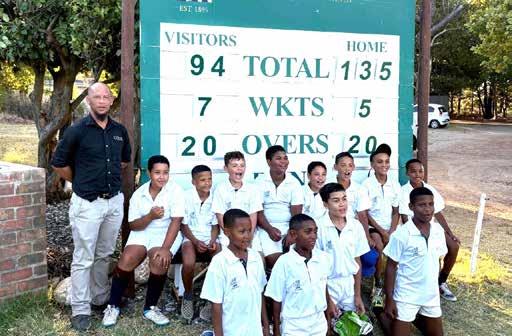
with a representative from the sponsor, The Oyster Collection.
me to pursue my academic goals and has made a significant impact on my future prospects. Thank you for believing in me and providing the necessary resources to help me succeed. I did my internship at Haute Cabrière where I was trained to become a chef and I am currently actively looking for a position to pursue my dream and goal on being one of the most successful chefs in Franschhoek.”
As next year is the 20th anniversary of FRANCO’s founding by Ron Whytock, the board has decided to delay our annual fundraising event to early next year. This timing will also in future allow more of our generous overseas donors to attend it, as opposed to its being held in a month late in each year. We also seek to pay tribute monthly to a person or an entity who has provided much assistance to our various community activities in the past year. This month we wish to pay tribute to Bruce Bradford, the proprietor of the Franschhoek Station Pub & Craft Bar, who not only generously supports FRANCO through monetary donations but also wholeheartedly supports and gets involved in our programmes. He plays a crucial role in our Children on the Streets programme by offering job shadowing and skills exposure opportunities to the boys registered with us.
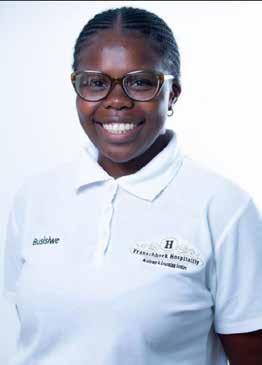
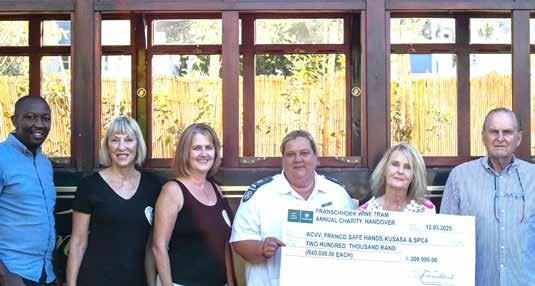
Douglas

Raising Awareness and Appreciation for Franschhoek Hospice
From 4-10 May, we join the global community in observing International Hospice Week – a time to highlight the vital role that hospice care plays in our society.
Hospice and palliative care focus on improving the quality of life for individuals facing life-limiting conditions. It’s not about giving up; it’s about living with comfort, dignity, and support. Hospice teams work to manage physical symptoms such as pain and fatigue, while also offering emotional, psychological and spiritual care for both patients and their families. The goal is to support the whole person – not just treat the illness.
Palliative care can be introduced at any stage following a diagnosis. In fact, early referrals are encouraged to ensure the best possible experience.
Early involvement often means better symptom management, more emotional support, and a truly holistic approach to care – allowing patients and their loved ones to focus on meaningful moments, rather than medical stress.
Here in Franschhoek, we’re proud to serve our
community through Franschhoek Hospice – a small but deeply dedicated team working to meet the unique needs of our valley. We provide compassionate home-based care, which includes regular visits from our two experienced registered nurses and our committed social auxiliary worker. We collaborate closely with local doctors and the Groendal Clinic to ensure each patient receives personalised, continuous care.
Volunteers are the heart of our hospice. Their time, care, and kindness allow us to do more than we ever could alone. Initiatives like our Tuesday soup and sandwich runs are a warm reminder of this generosity – bringing comfort and nourishment to those who need it most. We are truly grateful to the volunteers who make this possible.
Our care extends across the entire Franschhoek valley, including remote farming regions from La Paris Berries to as far as Allée Bleue. Whether a patient lives in the heart of town or in the quiet countryside, we are committed to reaching them with the care and dignity they deserve.
A special ‘thank you’ goes to our Hospice Shop team—Pearl, Evelyn and Lebo—for their tireless efforts. The Hospice Shop is not only a key source of funds, but also a place of community, connection and care.
As we mark Hospice Week, we invite the Franschhoek community to take a moment to learn about hospice care, support its mission, and help us continue serving with compassion and dignity.
HESTER STRŰMPFER
He will be one of four SA learners to represent South Africa in the International Geography Olympiad (iGeo) later this month.
However, it was decided that somehow other funds must be found. A long-standing supporter, The Oyster Collection of Guest Houses which includes La Fontaine and Avonrood in Franschhoek, decided to up their contribution. This gave impetus to those searching for sponsors.
The 18th International Geography Olympiad will be held online and hosted by France from 12 to 18 July, under the auspices of the International Geographical Union Olympiad Task Force. iGeo is an annual competition for the best 16 to 19 year-old Geography students from all over the world. Students chosen to represent their countries are the very best, chosen from thousands of students who participate enthusiastically in their own National Geography Olympiads. The aims of the Olympiad are to:
In January 2025 the Paarl legal firm Van Wyk Van Heerden – which recently opened an office in Franschhoek – had their annual game of cricket (Lawyers against Doctors) and on hearing of the tournament’s plight committed to sourcing funds from the players. Their contribution, along with The Oyster Collection’s donation, enabled a restricted form of the tournament to take place from 29 January to 13 March 2025.
• stimulate active interest in geographical and environmental studies among young people;
This tournament is structured to ensure teams of similar strength play each other in three separate logs. The 2025 winners were: Cup –Klapmuts Primary, Shield – Invitational Team, and Bowl – Wemmershoek Primary. Besides a big thank you to the two major sponsors – The Oyster Collection and Van Wyk Van Heerden – appreciation is expressed for the use of the Pniel and Bridge House fields, the coaches (especially Angus Simmers) and the donation of both prizes and food by two local families. The very successful 2025 tournament proves what a vital role sponsors from the community play!
• contribute positively to debate about the importance of geography as
by
• facilitate social contacts between young people from different countries and in doing so, contribute to the understanding between nations.
Text & Image: Richard von Hoesslin
SUSAN MÖLLER
It was an absolute pleasure to meet Professor Michiel Heyns, acclaimed author of ‘A Poor Season for Whales’. The enriching discussion, skilfully led by Joan Archibald, was a highlight of our gathering. We extend a warm welcome to Pieter Naudé, manager of Wordsworth, who will join us on 8 May 14h30 to delve into the award-winning novel, ‘Life of Pi’.
By die volgende byeenkoms van die Franschhoek Leeskring, wat op 7 Julie plaasvind, bespreek Danie du Toit Francois Smith se “Die getuienis”. Die byeenkoms word gehou in die NG Kerksaal. Lede en besoekers geniet vooraf n koffie koffie/tee met verrigtinge wat om 15h00 begin.
Navrae: 0729325393 Francois Smith se derde roman, “Die getuienis”, slaan ’n interessante nuwe rigting in, weg van sy twee vorige romans “Kamphoer” en “Die kleinste ramp denkbaar” waarmee hy reeds vir hom ’n beduidende plek in die Afrikaanse lettere oopgeskryf het.
Life of Pi, penned by Yann Martel, has achieved phenomenal success, with sales exceeding ten million copies worldwide. Martel’s masterpiece earned him the prestigious Man Booker Prize. In summarizing the essence of Life of Pi, Martel astutely distils it into three profound statements: “Life is a story”; “You can choose your story”; and “A story with God is the better story”. Our meeting will take place at the Dutch Reformed Church Hall. For enquiries, please contact 084 900 9060. Hester Strümpfer,
COLLEEN DOUGLAS

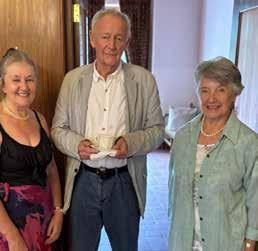
“Die getuienis” vertel die verhaal van Retha en Gerbrand wat saam met hulle twee seuns by ’n Christelike bedieningsentrum êrens tussen Naboomspruit en Bela-Bela woon en werk. Retha behartig die sentrum se administrasie, spyseniering en kommunikasie op sosiale media; Gerhard bedien die Woord en lei seminare. Hulle beland per toeval daar nadat hulle lewe in Pretoria ineengestort het en hulle al hulle aardse besittings verloor het. Die woord “toeval” pas egter nie in hulle manier van dink en praat nie; wat hulle betref, is alles voorbeskik en deel van God (na wie hulle deurentyd verwys as

A new playground for Foundation Phase learners at Franschhoek High School was opened on 26 March. The playground was made possible by the Fisker partners, Anders and Frank, who have visited Franschhoek the past couple of years from Sweden and Norway.
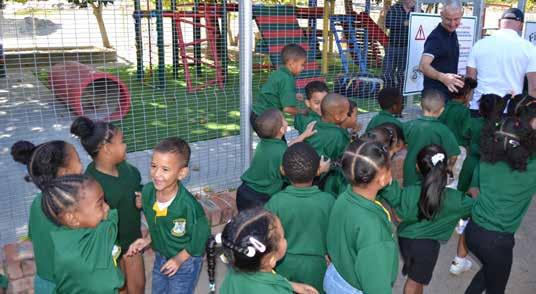
reminded those present how children spontaneously let their imaginations run wild. He stated that “today marks an inspiring moment in our school’s journey, as we gather to celebrate the grand opening of our newly upgraded play park here at the Foundation Phase. This space is not just a playground. It is an environment where imagination can soar, friendships can flourish, and creativity knows no bounds. It is a place where children can see colour, build castles, climb mountains, and conquer the world. This is more than a play park. It is a safe refuge.” The headmaster expressed the school’s deep gratitude to their main sponsor, the Fiskers. “Your generous support turned this project from a dream to a reality. Thank you for believing in the importance of play and investing in the joy and well-being of our children.” He also thanked all staff involved in the project, ABSA Bank and the
management team for their hard work.
He reminded those present that “As we stand here today, surrounded by the laughter and joy of our children, let us remember that play is not just a pastime, it is an essential part of childhood. It is through play that children learn the valuable skills of teamwork, resilience, and problem-solving. This upgraded play park is designed to inspire a spirit of adventure and creativity. Offering opportunities for our children to engage with their peers, learn new skills, and build memories that will last a lifetime. During 2025 our school celebrates 175 years of rich history. We are an old school with a new goal to lay the foundation for learning, where children can grow and ultimately succeed. What better place to start on our new journey than here at the grassroots of the school, the foundation phase.”
Text: René de Reuck | Image: Robert Carstens
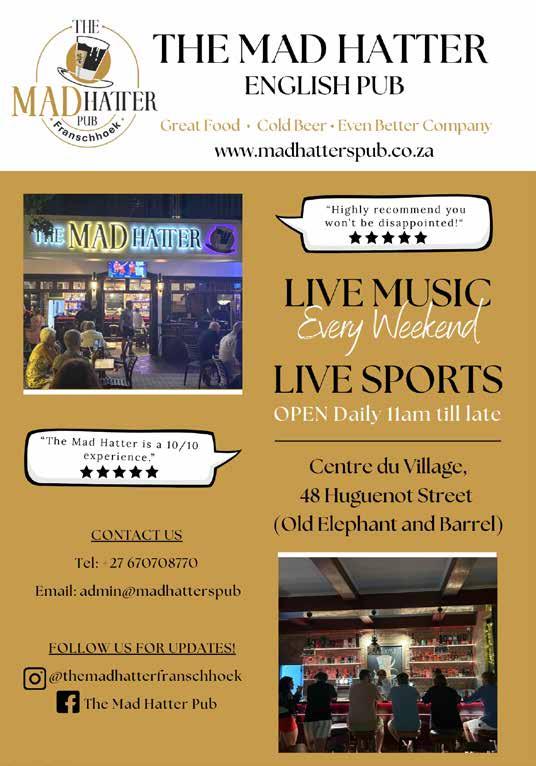
Siegfried Schäfer

Dear Readers, Government inefficiency – some would call it waste – is often in the spotlight. At times it feels nearly impossible to read any newspaper without being confronted by reports of government money having been spent with very little to show for it. The reasons for this can be varied, ranging from the costs imposed by adhering to often well-intentioned bureaucratic systems to mismanagement and corruption.
Some of the oldest instances of corruption have been traced back to the city of Ur, around 3000 BCE. Sumerian clay tablets have survived that contain references to officials taking bribes, manipulating resources and engaging in other fraudulent practices. It is probably safe to assume that corruption has been around for as long as there have been systems of governance and individuals who see opportunities to enrich themselves by exploiting weaknesses in these systems.
To prevent corruption governmental systems usually react by imposing more rules and regulations. However, it is only a matter of time before somebody also figures out how to evade or misuse these rules and regulations. Before you know it, yet another layer of red tape is imposed to close yet more loopholes – all the while making the system more and more expensive to maintain.
The results of compliance with red tape are sometimes ironic. It may often be both cheaper and illegal for a government official to go to a supermarket and buy an item rather than follow the legal procurement process.
Back in 1986 two Americans, Christopher
Cerf and Henry Beards, published a satirical book featuring examples of excessive prices paid by the US Defence Department. They called it ‘The Pentagon Catalog – ordinary products at extraordinary prices’. According to Cerf and Beards, McDonnell Douglas charged the Pentagon $37 for a screw. That however paled into insignificance when compared with a nut (the type that goes on a bolt) for which they charged $2043! Other examples included claw hammers for $435, screwdrivers for $285, a $387 flat washer, a $469 wrench and a $659 ashtray. There was also a $640 plastic toilet seat…
I don’t know whether any studies of such detail have ever been undertaken in SA. I did however recently receive a press release regarding the cost of legislative compliance in our local government sphere. According to the press release, “Research by the Financial and Fiscal Commission reveals that regulatory compliance now consumes approximately 38% of municipal administrative capacity, with some smaller municipalities dedicating up to 75% of their limited human resources to regulatory processes rather than operational improvements.”
The press release continues that “the updated 2024 Preferential Procurement Policy Framework has created processes so complex that the average municipal tender now takes 11-15 months to complete. According to the Centre for Development and Enterprise, regulatory compliance adds approximately 28-34% to the cost of municipal infrastructure projects.”
It doesn’t take a genius to conclude that a new approach to government procurement is needed. I hope there is a supply chain management or public finance guru out there who can find a simpler way to reconcile accounting for public expenditure with more efficient and less costly oversight. I suspect it’s going to be a tough nut to crack… Until next month!
Bookings - 16 May 2025 | Artwork - 19 May 2025 | Editorial - 16 May 2025
WE KNOW YOU CARE, WE KNOW YOU WANT TO HELP
BUT PLEASE...
TO CHILDREN WHO BEG ON FRANSCHHOEK STREETS DO NOT GIVE MONEY OR DIRECT SUPPORT
No matter how well-meaning, direct support keeps our children on the street: Giving money or support of any kind directly to children on the street might seem harmless, or helpful, to members of the public, tourists, and businesses. The truth is that it means keeping them out of school, on the streets, and locked in the hands of those exploiting them.
Unfortunately, once a child settles onto the street and allows the street to become their survival paradigm, they become locked into street life and resistant to change
The money they get from begging: No program, organization, centre, or school can compete for the child's attention when they can earn over R50 a day in our smaller provincial towns, never mind the odd foreign currency equivalent of R200. This money is not used for food or schooling needs but goes directly into substance abuse, or is handed over to support their guardians' substance abuse.
Food from restaurants and locals: Many restaurants, small businesses, and individuals feel sorry for the children, so give them food and even small jobs for money. This helps sustain the children on the street, validating their impression that life on the streets is better and
keeping them out of school and out of the programs set up to look after them.

Public support: Many well-meaning members of the public give the children shoes, clothes, and food items. Most of this is sold or traded and is used not only to sustain them on the street, and pay for drugs but also to encourage them to remain on the street. Many people want to help but often don’t know how to give responsibly. By donating to the FRANCO StreetKids Centre, you can make a significant impact on our children’s future. We offer daily hot meals, tutoring, mentoring, hygiene facilities, trauma counseling, sports, karate, yoga, and skills programs. Most importantly, we provide LOVE and RESPECT for their innocence.

South Africa’s relations with the US are at a crossroad. With fallout from the signing of the Expropriation Act into law, the withdrawal of USAID, and the expulsion of South Africa’s ambassador to the US, tensions have only simmered further, with much debate now around South Africa’s future participation in the African Growth and Opportunity Act (AGOA).
“South Africa cannot afford to make adversaries of any global economic power. Our economy has stagnated over the past 10 years, with the government essentially having run out of money. Over the last financial year, our debt-service costs amounted to R389 billion, with our debt-to-GDP projected to reach 76.2 per cent in this financial year,” says Stefan Kritzinger, Head of Compliance and Support at Govchain.
“AGOA, our largest trade agreement with the US, remains at risk. Several US political leaders have already called for South Africa to be removed from the programme, which would result in devastating consequences for our economy,” continues Kritzinger.
Since AGOA’s enactment in 2000, South Africa’s exports to the US grew at an average annual rate of 12.98% between 2002-22, while 70% of South Africa’s agricultural product exports to the US have benefitted through the programme.
South Africa is rich in natural resources and quality agricultural products. However, for businesses to enjoy the financial benefits of the imports and exports business, there are several regulatory boxes they must tick.
A business needs to be registered with the CIPC to legally trade. The basic requirements for registering include a company name, a business registration number, as well as tax number from SARS.
“This should be followed by applying for an import and export license, bearing in mind that the license is only officially required when the total imported or exported cargo is R150 000 or more within a year, that there are more than three imports and exports in one calendar year, and that the business is import for resale or business purposes and not for personal use,” explains Kritzinger.
Without this license, a business cannot clear goods at customs, legally cannot trade across borders, especially because SARS tracks imported and exported goods for tax and compliance.
To apply for a license, a business would need to complete a DA 185 application form and submit its CIPC company registration certificate, tax clearance certificate, bank confirmation letter, as well as a certified copy of the applicant’s ID or passport with the completed form to SARS.
Upon approval, SARS will provide the company with an import and export code that will be used every time a business moves goods across the border.
Kritzinger added that “understanding import duties, VAT and customs fees is also equally important. While VAT is charged on all imports, customs duties vary depending on the type of product. On the other side, most exports are zerorated for VAT, meaning there is no charge, but businesses are encouraged to keep clear records of exports to qualify for tax exemptions.”
Lastly, businesses must remain cognisant of any product restrictions and trade agreements. For example, alcohol and tobacco require additional import permits, while fresh food and agricultural products require health and safety certificates. Trade agreements may also qualify certain products for lower custom duties.
“Despite the current rocky diplomatic dispute with the US, South Africa still enjoys trade relations with the country, as well as many other lucrative markets around the world. It is important for businesses to get the compliance correct so they avoid missing out on the benefits,” Kritzinger concluded.
Text: Editorial Desk

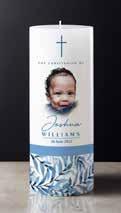
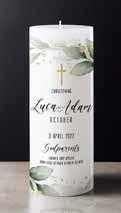
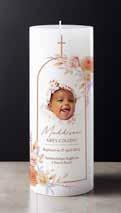
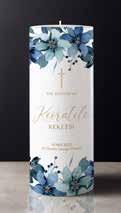
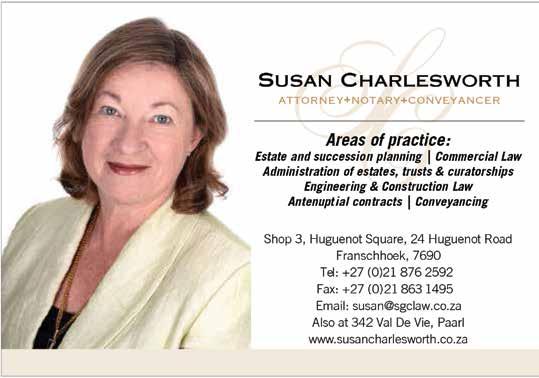
GRAEME FALCK
Verify Banking Details Before Paying Any Invoice – You’re At Risk, Not the Creditor
Cases of Business Email Compromise (BEC) fraud continue to surge, and recent High Court decisions have confirmed that it’s up to you to verify that you are paying into the correct bank account.
BEC fraud involves cybercriminals impersonating your trusted contacts (e.g. suppliers and professional advisors) in fraudulent emails that look genuine. The idea is to trick you into making payment into the scammer’s account.
Everyone’s at risk, but BEC is particularly rife in transactions where large amounts of money are in play. Favourite targets are commercial operations and their customers, as well as all role-players in property sales – buyers, sellers, conveyancers and estate agents.
For a snapshot of a classic BEC sting, have a look at this recent High Court case…
Two Cape Town companies, who had been trading happily and successfully with each other for seven years, fell out over who should bear a loss of R886,726.25 after scammers stole the customer’s payment for a consignment of valves. Here’s how it went down:
• The customer had always made payments to the supplier’s Standard Bank account in the past.
• Joe Scammer intercepts the supplier’s email correspondence and, pretending to be the supplier’s managing director, asks the customer to make all payments to an Absa bank account from now on.
• The customer asks for a bank confirmation letter, which Joe Scammer (still in his guise as MD) gladly supplies.
• Reassured, the customer makes payment to the Absa account. The fraud is only discovered when, three days later, the supplier emails asking for payment.
• Joe is of course now long gone with his loot, leaving customer and supplier to fight it out over who must bear the loss.
The customer, sued by the supplier for the outstanding amount, contended that the blame lay with the supplier, whose own negligence in failing

to secure its IT systems against email interception caused the fraud.
That’s a defence often raised by BEC victims, and indeed our courts have stressed in the past the need for suppliers and professionals to ensure that their own computer systems are properly secured at all times. However, said the Court, (emphasis supplied), “it is the debtor’s obligation to ‘seek out his creditor’ and … until payment is duly effected, the debtor carries the risk that the payment may be misappropriated or mislaid.”
The real cause of the loss in this case, held the Court, was not any hacking of the supplier’s emails (if there was in fact a hack – the supplier denied it), but the customer’s failure to take the steps that a “prudent debtor” would have taken to ensure that it was paying into the correct account.
Pick up the phone! Our courts will have no sympathy for you if you fall victim by not protecting yourself. A factor that counted against our customer here was (emphasis supplied): “the fact, known to any persons in business and making use of computer-based methods of communication and payment, that cyber-crime is rampant and that care must be taken at all times to limit its impact.”
The good news is that a few simple preventative measures can provide everyone involved with a strong layer of protection:
1. Put in place strong policies and procedures to ensure that your IT systems and emails are secured against breach and interception.
2. You, and all of your staff, must remain constantly vigilant against the techniques which the scammers use. They are particularly adept at exploiting trust-based and long-standing relationships, for instance with suppliers you have dealt with for years, and professionals like attorneys, accountants and financial advisors etc.
3. Most importantly, perhaps, given the current attitude of our courts, is to always verify payment details via contact with your creditor through another communication system. As our courts have pointed out, “a simple telephone call” can be enough to avoid falling victim to fraud.
(Credit to LawDotNews and Falck Incorporated Attorneys)








RENÉ DE REUCK
Vivian van der Merwe

EBONY/CURATED Bordeaux House
In his first solo exhibition with EBONY/CURATED titled FORM|SILENCE, Vivian van der Merwe presented nine new paintings that resist narration, offering instead a meditation on stillness and form.
Mark Stanes opened the walkabout with Vivian van der Merwe, who eloquently discussed his thoughts on painting and his art.
Vivian van der Merwe was born in 1956 in Cape Town. His earliest works demonstrated an apparent artistic prodigy. In 1980, he completed his studies under Stanley Pinker at the Michaelis School of Fine Art, U.C.T. In 1983, he was awarded his Master of Fine Arts Degree. During his formative years in the 70s, he worked under Vumi-kosi Zulu at the internationally respected Rourke’s Drift printmaking studio in Dundee. His earliest recollections are of constant and consistent drawing. He commenced painting full-time and was introduced to Anthony Goldstein of Gallery 709 as his first art dealer. Since 1995, Vivian has been a professional artist and taught students at his studio in Stellenbosch.
The artist states: “When language is pushed to the limits of its expressive form, it reaches a threshold
HARRY OWEN

A question I am occasionally asked is why some poets write entirely in lower case. “What’s wrong with capital letters?” an indignant individual demanded of me recently, as if I were somehow to blame.
It got me thinking.
The honest answer is that I don’t know. My own preference is to employ ‘normal’ orthography and punctuation more often than not, departing from this only when it seems to me necessary to make a point.
For example, as a young man I lived for a while in California, where I was welcomed with generous hospitality. The home in which I first stayed was luxuriously appointed, its deep-pile carpeting almost swallowing me at the knees. It was wonderful.
CHARLOTTE VAN ZYL
The Granddaughter by Bernard Schlink.

Publ. Weidenfeld and Nicholson. 325 pages. In Greek mythology a sculptor named Pygmalion created a statue of a woman so perfect that he fell in love with it. The gods were so moved by this that they brought her to life and named her Galatea. George Bernard Shaw used this myth to create a play of the same name, which subsequently became the evergreen “My Fair Lady.” Bernard Schlink, the German author, consciously or not, used this myth in his best-selling novel “The Reader” (later made into a brilliant film starring Kate Winslet) in which a young German boy teaches an older woman to read and appreciate books, only to find that she has been a concentration camp guard. The implication being that her illiteracy prevented her from comprehending the evil that she was involved with.
In his latest novel, “The Granddaughter” Schlink returns to the theme, and again sets it in Germany, although in this case post-unification Germany. The second half of the book, which is arguably more interesting than the first part, tells the story of a kindly, literate bookseller, Kaspar, who goes from contemporary Berlin to the backwaters of the former German Democratic Republic. He is on a quest to look for a child. His wife had just died
beyond which it can no longer cope. As George Steiner put it, it is ‘the shores of silence’. “It is in this silence, beyond rhetoric, beyond meaning, beyond narrative, and beyond the conceptual, where things like music, mathematics, physics, and painting begin. This silence is ineffable. The silence is the ‘sine qua non’ for my painting, enabling my pursuit of visual form and beauty.” Vivian is struck by the philosopher Denis Dutton’s suggestion that humans are hard-wired to seek beauty. Far from being simply “in the eye of the beholder” art is a core part of human nature, with deep evolutionary origins.
The art historian and critic, Deon Liebenberg expands on Vivian’s work: “Whatever the artist’s exact intention or worldview, it can be said to form part of this long-standing tradition. Like Mondrian, Malevich, Kandinsky, and several other modernist abstract painters, Vivian uses the careful manipulation of geometric shapes and planes in the painting to express something that goes beyond the everyday. The sophisticated and ambiguous play with space, with illusion and allusion, has extraordinary evocative power – the poetry in everyday objects and spaces is richly articulated in a way that resonates with the viewer’s Kantian or Platonic domain that might exist beyond the reaches of empirical science or rationality.”
Viewing his still life paintings with single objects, one is immediately struck by a complex diffusion of light. Vivian’s next adventure is to view Vermeer’s
One afternoon, while meandering around this palace on my own, clad only in t-shirt and shorts (a far cry from the way we tended to dress in Liverpool!), I was horrified to discover that I had been bitten on my leg by a flea. Several times.
I blamed a combination of the family cat and hot August weather but was nevertheless furious that this ghastly creature could have been so vile as to attack me. Me! In a frenzy of disgust, I speedily caught and disposed of the flea as well as a few of its friends that also seemed to find my blood attractive. Weirdly, this process made me feel virtuous.
Only later, on reflection, did it occur to me that the flea held no personal animosity toward me; indeed, it had to bite in order to survive. I was its food – its unwitting (and decidedly unwelcoming) host.
And yet, as an unpaying guest, I was at the same time quite happy to accept the generosity of my own hosts. So was I really any better than the flea that depended on me?
Hypocrisy being no barrier to writing a
and before her death had confessed that she had had an illegitimate child, a daughter, that she had given away blindly in a panic, some years before she met him.
Kaspar, because of his devotion to his wife and because they never had children of their own, sets off on a mission to find the daughter that he never knew. He prepares by reading all the notes and fragments of a novel that Birgit, his wife, had left behind. This could be the theme of a crime novel (which Schlink also writes) and it is indeed a journey into the dark soul of the GDR, where neoNazi groups still believe that the Holocaust was a myth spread by Zionists and that the Nuremberg trials were a travesty of justice.
Kaspar, the amateur detective, follows various clues that he finds in Birgit’s journals, meeting many of her erstwhile friends, until he eventually finds the missing daughter. She is married to an uncouth farmer and they conform to the worst type of unreformed Nazis. However, they have a beautiful 13 year old daughter with stunning red hair.
Kaspar comes to an arrangement through which he pays the daughter of Birgit her portion of Birgit’s testament, but on condition that he can have Sigrun, the granddaughter, stay with him during school holidays. This is where the Pygmalion theme is introduced. Sigrun is a dyed in the wool Nazi, however, she loves music and is quite an accomplished pianist. But she only plays the music of German composers. Kaspar encourages her to play and introduces her to other composers. He takes her to art galleries and to museums and generally introduces her to the wider modern world.
The reader is lulled into believing that the
‘The Art of Painting’ or ‘The Allegory of Painting’ at the Kunsthistorisches Museum in Vienna. He was captivated and greatly inspired by the luminosity and shadows in Vermeer’s paintings in the Rijksmuseum.
The Byzantine mosaics in Ravenna moved Vivian to recognize a connection between medieval choral music and these luminous works of art.
The illustrated ‘Capricciosa Storico, Theme and Variations, Op 193 Oil & Mixed Media on Canvas’ has a flattening of shapes reminiscent of Ben Nicholson, using shape, form, colour and line. Considered colour in contained shapes and composition, shows deference to Henri Matisse. The collaged sheet music is the opening of Beethoven’s late quartet 132 in A Minor, arguably one of the most complex yet beautiful chamber compositions. The artist demonstrates a thoughtful and masterly rendering of paint and matter.
Another striking painting in oil and mixed media on canvas,’ Capriccioso Storico, Theme & Variations, Op 194,’ depicts violin fragments of a scroll, fingerboard, and hourglass soundboard. It conveys a sense of composure but also an unexpected element of surprise. Both titles refer to Beethoven’s chamber music pieces, translated as ‘historical whim’, free and impulsive. The ‘storico’ (historical in Italian) is an allusion to the centenary of Synthetic Cubism.
As a consummate and assured artist, Vivian evokes a world of tranquillity and timeless form. He states that ‘eidos’, the pre-Socratic form or essence, encompasses the outward manifestation of reality.
poem, I produced this – all in lower case in acknowledgement of my tiny assailant: flea
it danced it here now there again and sprang its music deep upon me i speak i speak i speak i speak sucking out a sip of me for it to live a fat disgust a hot sink drowning a crushing between fingernails i this god dispense in answer to its helpless daring while i this flea am honoured here in answer to my need and worse and worse expect it
Harry Owen
From The Music of Ourselves, Cheshire CC, 2004
Lower case just felt right on this occasion and, since the poem is really a performance piece, perhaps the style hints at how I’m inclined to read it aloud.
But that’s just me. Curious to know more, I

experiment will succeed, and indeed, the relationship between Kaspar and his step granddaughter is moving and intimate as trust gradually grows between them. However, the East Germans fight back and Sigrun is caught in the crossfire.
What eventually happens is emotionally disturbing, but not unexpected in a historical context. After regime change in many countries the cultural, religious and political differences play out in unexpected ways. Think of India, Afghanistan and Austria to mention a few. Germany, in the European backyard, is closer to home, and the results of re-unification are still being felt.
The first half of the novel takes place in the period before the fall of the Berlin Wall and provides the background to the story of Sigrun. There are fascinating passages describing life in the 1960s,
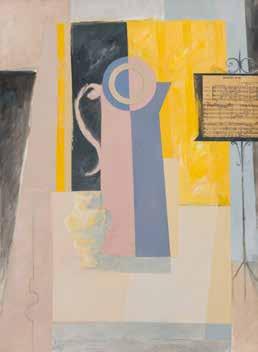
It describes the perceptible characteristics of the world, including appearances and shapes. His art has successfully encapsulated this idea. info@ebonycurated.com www.ebonycurated.com
invited some of my Facebook friends to offer their opinions. Here are a few of their reasons for using the technique:
• to break up traditional form
• to make a social/political statement about the role of language
• to force every word to ‘work for its living’
• to eradicate undue emphasis implied by capitalization
• to step away from convention and toward greater clarity
• to produce a ‘dreamy’ effect in a love poem
• to enable a democratization of the text, reducing formality
• to help shape the poem
• to follow the lead of e.e. cummings, who used lower case even for his name! There were many more. And at least one respondent called it a ‘gimmick’, claiming that it distracts from rather than adds to the poem. What do you think?

focusing on the day trippers from West Berlin, including figures like Kaspar, who explore the “backward” life in the GDR. At the same time, some of the Easterners despise the flashy life of the decadent West.
This fascinating, gripping story is both a moving depiction of love and affection between two people separated by two generations, as well as an astute analysis of a period of German history.

@home’s new flagship store showcases an immersive, curated experience for its guests

Nestled in a charming heritage building in Franschhoek’s town center, the new Granny Goose Sleeplab invites you to experience the ultimate in premium bedroom homeware and bedding. True to the brand heritage, Granny Goose has created a space where slow shopping meets expert advice, offering you a chance to explore their collection of bedding essentials and touches of luxury in a setting as timeless as the craftsmanship of their products.
Visit the Sleeplab and discover a collection of all the most loved Granny Goose sleep essentials: the luxurious Featherbed mattress topper and the indulgent Dreamseeker Duvet Polish Goose Down Duvet.
Alongside these timeless favourites, you’ll find a selection of serene décor, soothing home fragrances, and our range of classic linen. Every item has been thoughtfully chosen so you can create a space of calm, comfort, and understated luxury so ultimately, you sleep better.
For nearly three decades, Granny Goose has specialized in allnatural bedding designed to elevate your sleep.
Step into our heritage-inspired space and rediscover the joy of restful, luxurious sleep with experienced staff to assist you with finding the perfect bedding for your comfort.
Address: Shop 1, 22 Huguenot St, Franschhoek, 7690
Hours: Mon-Friday 9am – 6pm
Weekends 9am – 5pm
Phone: 021 863 5505
www.grannygoose.com
JACCUZI FOR SALE: 4 seater, good condition. Jet spray and air bubbles adjustable. Built in heater. Under water lights, red and blue. New floater and starter pack chlorine tablets. Buyer to remove. Area, Wemmerschoek, De Hollandsche Molen. R8000 cash.
Contact Mr H.A. Louw. Cell: 0827396998’.
POKER / RUMMY: Retired international travel executive, new to Franschhoek, would like to join a local weekly or monthly poker group or play gin rummy. 084 345 9027
HOUSEKEEPER JOB WANTED: My name is Ncebakazi Mtaba. I’m looking for a housekeeper job. I have more than 5 years’ experience and can work under pressure. Available 3-5 days a week. I live in Franschhoek and am available immediately. My number is: 073 367 0639.
SADIE FAMILY WINES from Private Collection! From R795 & up per bottle. WhatsApp 064 482 2925.
GARDENER/DOMESTIC: My name is Isaac Phiri.
I’m a Malawian looking for a job doing gardening or domestic work. I have 5 years’ experience. I will be happy if you take me to work for you. My number is 073 768 1226. Reference: Beverley Markgraaf 060 5080 288. (Domaine des Anges)
PLATTER GUIDES: Lifetime collection of Platter Wine Guides for sale. Every issue from highly sought-after first-ever 1980 edition to 2020 edition. All in excellent condition. R29k. WhatsApp 082 391 5327.
SERVICES OFFERED: I’m Theo de Koker (formerly of Cathmar). I offer the following services: 1. DSTV installation, 2. Surround sound installation, 3. Electric Fence service, 4. CCTV installation, 5. Laptop repairs, 7. Programming of remotes. Contact me at: 082 822 7349 Need a PET/HOUSE-SITTER with good references? Contact Ronelle @ 073 646 1687
RE-THINKING YOUR GARDEN? For Garden Consulting call Susan at 072 932 5393
PET / HOUSE SITTING: Tina Stanley. Trusted pet & house sitter in Franschoek, WC. Reliable care for your pets & home, ensuring peace of mind while you’re away. Contact 083 448 4951 for bookings & references.
RE-FIBRE GLASS YOUR POOL in any colour you like. Call RiaPools for a quote: 072 347 5355
CHANGING TO A SALT WATER SYSTEM? Let us advise & quote for you! Call RiaPools: 072 347 5355 POOL PUMP PROBLEMS? Noise? We quote and help you out! Call RiaPools: 072 347 5355
STUFF WANTED: All manner of clothing and household items needed for our ‘First Friday of The Month’ jumble sales. Please help us to help the animals of the valley. Please drop off at the SPCA clinic in La Provence Street, Groendal, or phone for us to collect. 021 876 4808
FRESH, ORGANIC FARM PRODUCE: Delivered weekly to Franschhoek, including vegetables and fruit in season, chicken, eggs, cheese, honey, etc. Lists of available produce received on Monday, orders placed on Tuesday for Wednesday delivery. A number of Franschhoekers are already receiving weekly deliveries. To be added to the list contact Sue Norman on 083 321 3442 or suenorman50@outlook.com.
DO YOU STILL HAVE THAT POOL LEAK? Losing water all the time? Let us quote and take care of the problem! Call RiaPools: 072 347 5355
PROFESSIONAL POOL SERVICE REQUIRED? Keep it local! Get a quote. Call RiaPools: 072 347 5355 HOUSE/PET SITTER: I have worked with animals for over 20 years. I need to bring my 16-year-old dog with me. He sleeps all day and is not a barker. Fees are reasonable and references are available. Internet access essential. For further details call Rentia 072 324 3882.
SPORT
FRANSCHHOEK TENNIS CLUB: Social tennis is played at the club on Fridays, Sundays and Public Holidays from 08h30. For more information contact Nicky. 082 455 6411 PARKRUN: Saturdays at Rickety Bridge Wine Estate. Time: 08h00. Cost: Free. Register at www.parkrun.co.za
CHURCH SERVICES
METHODIST CHURCH: Sunday service 10h00. Rev Russell Norman. 021 872 3580 or 082 662 4509. NG KERK: Sondagdienste 09h30. Geen aanddiens. Dr. Ryno Els 083 610 1641. Besoekers welkom.New Apostolic Church: Le Roux Street, Groendal. Sundays 09h00, Wednesdays 19h30. Rector: Charles Leibrandt. ST GEORGE’S ANGLICAN CHURCH: Groot Drakenstein. Sunday Services: Holy Communion and Sunday School 10h00. Revd Wilfred Meyer 084 407 1280. Office - 021 874 4008. willowdale@cybersmart.co.za
SHOFAR CHRISTIAN CHURCH: Services - 09h00 & 18h00 English services at 7 Lambrechts Street. Pastor Richard Wade. 083 225 8529. All welcome!
UNITING REFORMED CHURCH: Sunday service 09h30. Dr Shaun Burrows. 021 876 2632. Visitors welcome.
GENERAL
Alcoholics Anonymous: WED evenings 19:00, Groendal Community Centre, Contact David +27 83 305 5159
ACCOUNTANTS Tax Shop 021 876 2676
ATTORNEYS Susan Charlesworth 021 876 2592/072 402 9469
AUDIOLOGISTS Heidi Allan 021 876






















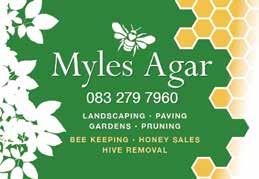

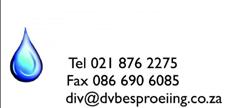




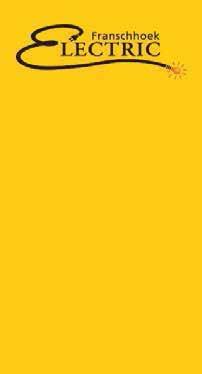




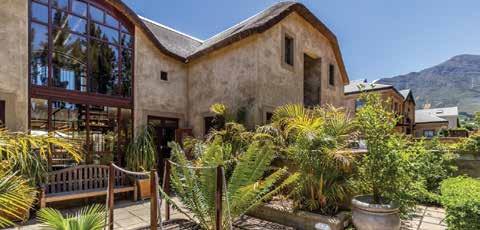
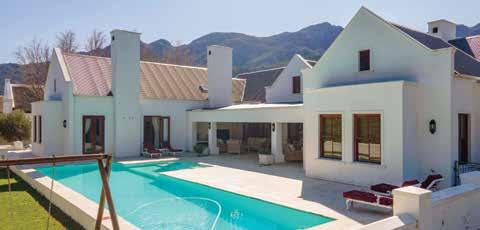

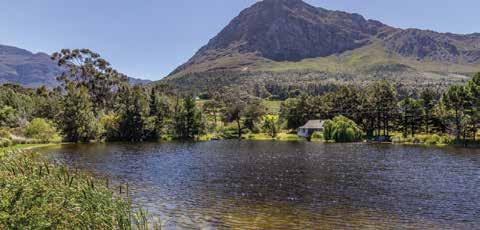

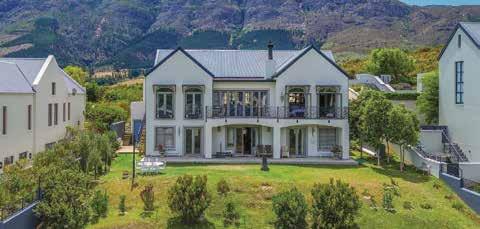

Greeff Christie’s International Real Estate is proud to announce that esteemed Agent Guy Healey has been awarded two of the company’s most prestigious honours: induction into the Gold Circle Club and entry into the elite 100 Million Club at the annual Circle Club Awards. These accolades are reserved for top-performing agents who consistently demonstrate excellence, integrity, and outstanding results in the property market. The 100 Million Club recognises agents who have achieved over R100 million in sales — a milestone attained by only a select few within the company. This, along with Guy’s inclusion in the Gold Circle Club, places him among the very best in the Greeff Christie’s network.
Guy’s real estate journey spans more than 30 years of buying, renovating and selling properties across South Africa and the UK. Since launching his property career in 2010, he has built a reputation for integrity, professionalism and outstanding results. His rigorous approach to market analysis, coupled with his skill as a negotiator, has seen him consistently deliver superior outcomes for both first time buyers and seasoned investors alike.
In keeping with our commitment to collaboration and excellence, Guy has recently formed a partnership with Tania Van Deemter. Tania brings 25 years of comprehensive real estate expertise, having begun her career in Central London where she specialised in high value sales for clients across the UK, Europe and the Middle East. After 14 years abroad, she returned to South Africa and established herself as a trusted name in Franschhoek. Her ability to bridge international investors with local opportunities, combined with her dedication to community initiatives, enriches the level of service she and Guy can offer.
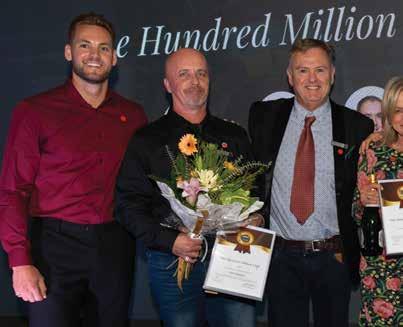
“These awards reflect Guy’s deep market insight, exceptional service ethic and the collaborative spirit he brings to every transaction,” says Aimee Campbell, Principal at Greeff Christie’s International Real Estate, Franschhoek. “Together with Tania, he exemplifies our brand values and reinforces our position as leaders in luxury real estate.”
Please note that our Franschhoek office has relocated. You can now find us at: Unit 3, 62 Huguenot





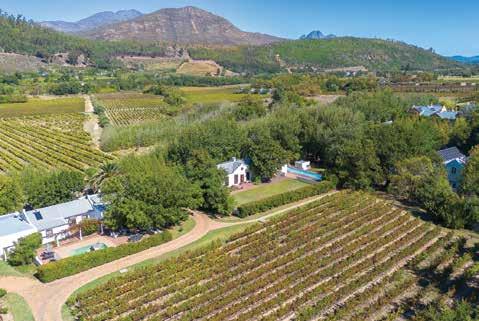


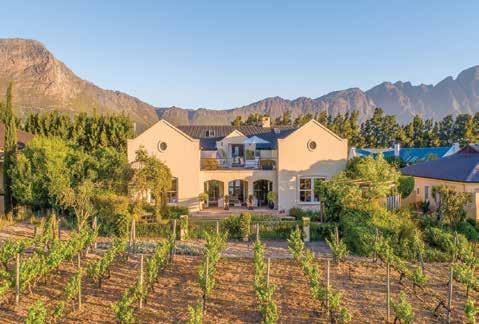

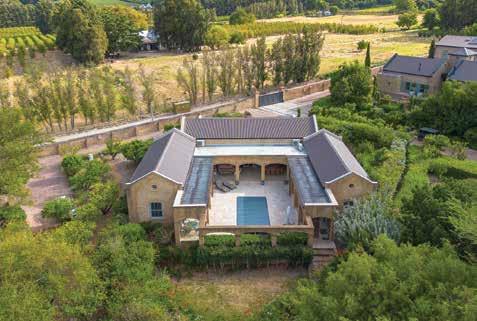

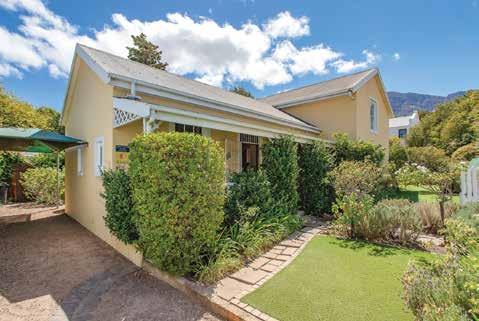

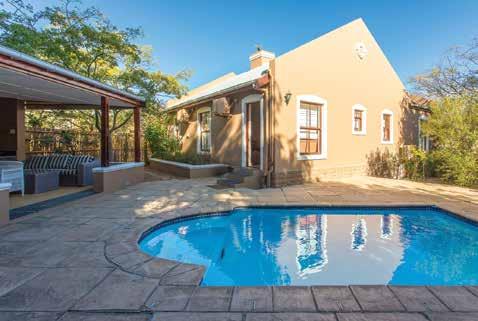

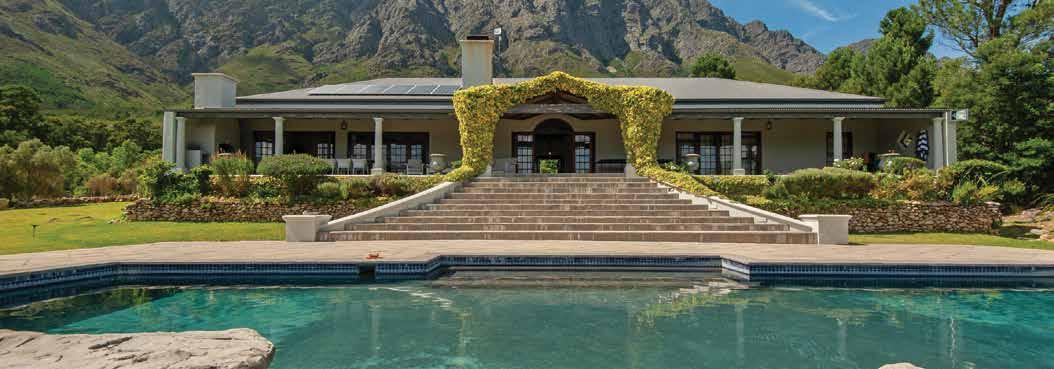
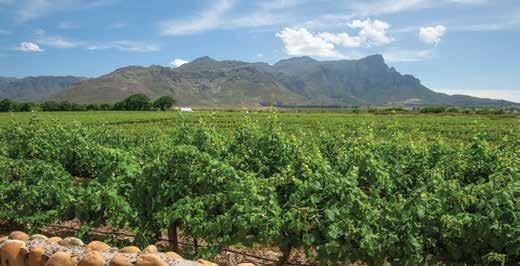
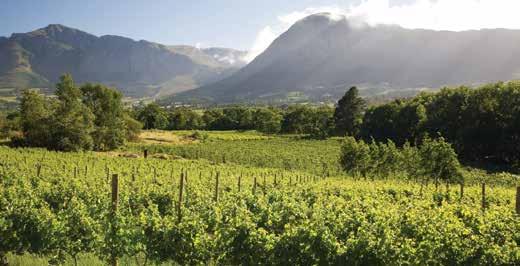
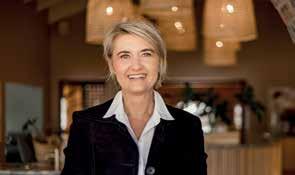
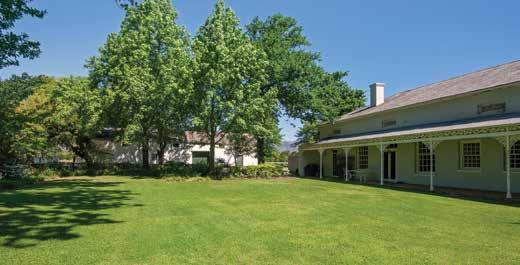
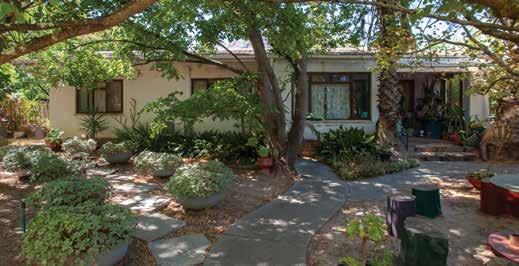
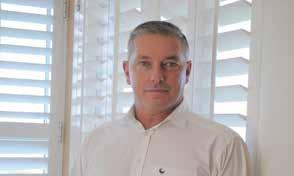
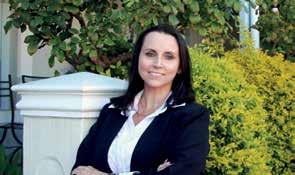
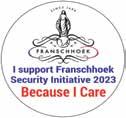

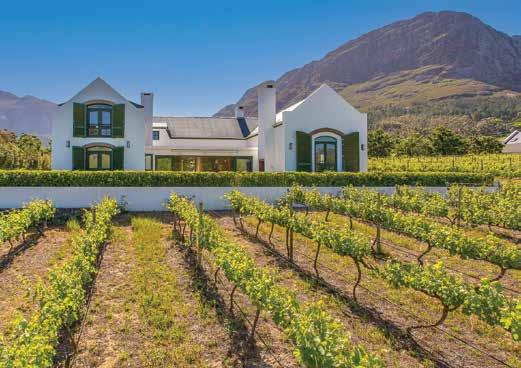
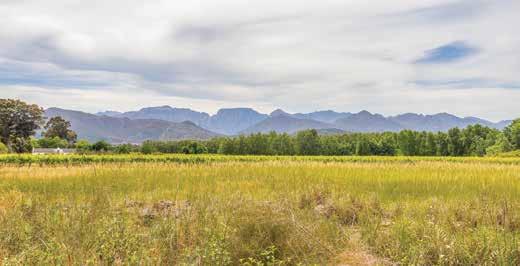
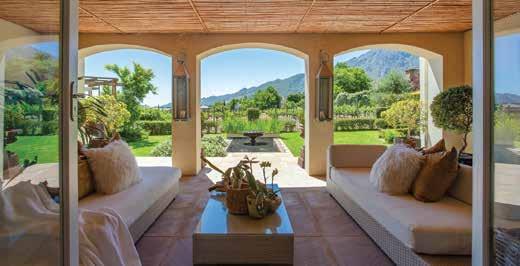

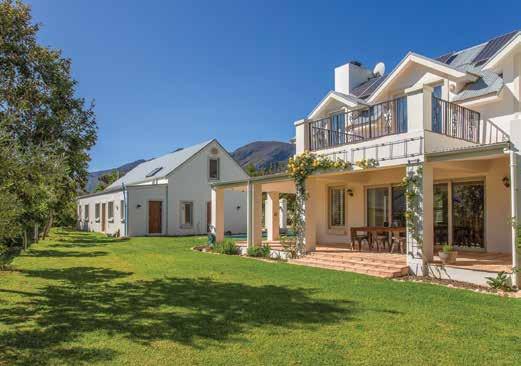

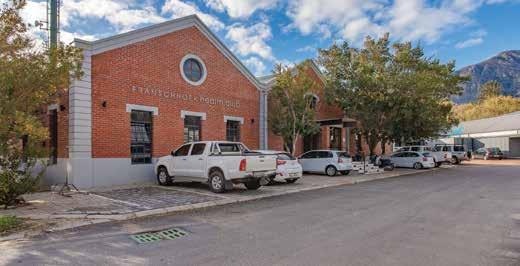

FEATURE PROPERTY
EXCLUSIVE MANDATE; This exceptional heritage property, is just a short walk from Franschhoek’s restaurants, shops, and galleries. Originally built in 1857, the home has been sensitively restored to preserve its period charm while incorporating modern finishes. Features include oak wood floors, sash windows, and high ceilings, creating an elegant, timeless atmosphere.
The home offers 6 en-suite bedrooms, a guest bathroom, 5 living rooms, and 5 verandas, providing ample space for entertaining and hosting large groups. Its versatile floor plan allows for use as a spacious family home with additional guest accommodations or as a hospitality property. The tranquil garden,
FEATURE PROPERTY
sparkling pool, and verandas are surrounded by stunning mountain views and ancient oak trees.
Additional highlights include exclusive parking for 6 vehicles (4 garaged), a large solar system with power backup, and many high-end features. The property is part of the Riverside Oaks sectional scheme, which consists of three homes.
Tom Clode 079 955 3114
Terry-Lee George 082 650 9194 R27 900 000 + VAT
Boasting some of the finest views on the slopes of the Fransche Hoek Estate. A charming front garden and entrance stoep invites you in to spacious open-plan living areas incorporating two lounges, a showcase kitchen and openplan dining all leading out to the viewing terrace. Also offers a well-equipped scullery and separate laundry with direct access to the drying yard and double garage.
Leading off the living areas: luxurious master bedroom with semi open-plan bathroom, a separate toilet and bespoke dressing room as well as a large office and guest bathroom with potential to convert to additional accommodation with approved plans available.
Downstairs: a further two spacious bedrooms
with full en-suite bathrooms as well as a private family lounge/office and compact kitchenette flowing out to the terraced garden with ample space for a pool and gorgeous mountain and valley views.
A full solar system with back-up inverter and batteries is included. In addition, approved plans are available to add further accommodation.
This home must be viewed to appreciate the beautiful setting, excellent design and many hidden features.
Tom Clode 079 955 3114
Terry-Lee George 082 650 9194 R14 850 000
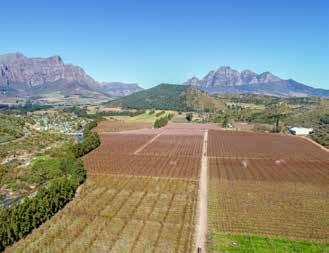
This unique farm extends over +-189 hectares and comprises three titles to be sold together as a single package. The land is bordered by breathtaking mountains and comprises approx. 40 ha of quality arable land cultivated to a number of plum varieties to suit the export market. Water is abundant with pumping rights from the river (fed by the Wemmershoek Dam) as well as a natural supply from the surrounding mountain streams and waterfalls.
Tom Clode 079 955 3114
Terry-Lee George 082 650 9194 R54.5 million plus VAT



CONTEMPORARY HOME ON FRANSCHE HOEK ESTATE
This three bedroom en-suite home boasts high end contemporary finishes throughout including wooden floors, high ceilings and high quality aluminium doors and windows. Open plan living/dining/kitchen areas with stunning views over the Franschhoek valley. Compact walled garden with plunge pool and large double garage. Beautiful setting and excellent design and finishes.

EXCLUSIVE MANDATE. A rare opportunity to own this 23ha Boutique Farm and Winery in a spectacular setting overlooking the Franschhoek valley. This property presents many revenue possibilities to support your dream lifestyle. Includes 120t wine production and cellaring facility along with a 330m2 tasting and function venue. Five dwellings including a 4 bedroom main house and 3 bedroom farmhouse. This combination of natural beauty and a prized Franschhoek lifestyle is a unique opportunity for the right buyer.
Tom Clode 079 955 3114
Terry-Lee